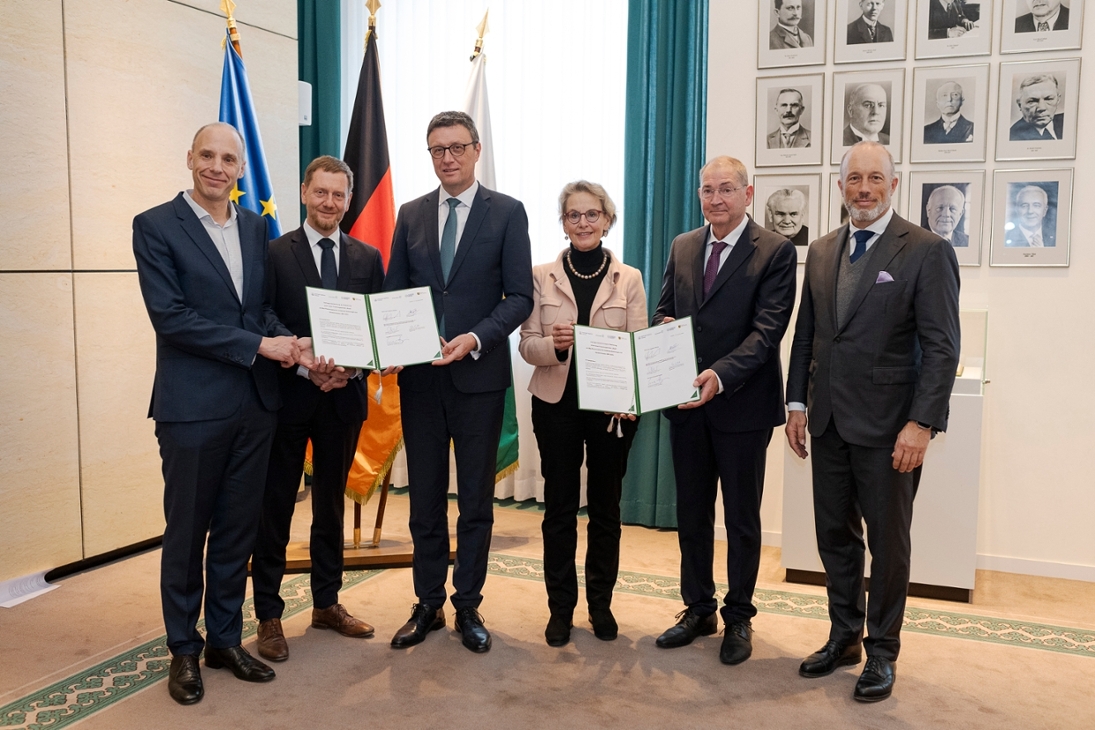
© Pawel Sosnowski
November 2024
In the presence of Minister President Michael Kretschmer and Minister of Science Sebastian Gemkow, representatives of the Boehringer Ingelheim Foundation, the Max Planck Society, and TUD Dresden University of Technology gathered at the Saxon State Chancellery to sign a contract for the establishment of the innovative research program Biomedical Artificial Intelligence (AI) – BioAI Dresden.
The non-profit Boehringer Ingelheim Foundation is supporting the project with EUR 20 million over a period of ten years, thereby providing half of the EUR 40 million total. The Max Planck Society, TU Dresden and the Free State of Saxony are financing the other half of the project, which aims to facilitate research in the field of biological and biomedical AI. To this end, a new division with two research groups is being established at the Center for Systems Biology Dresden (CSBD).
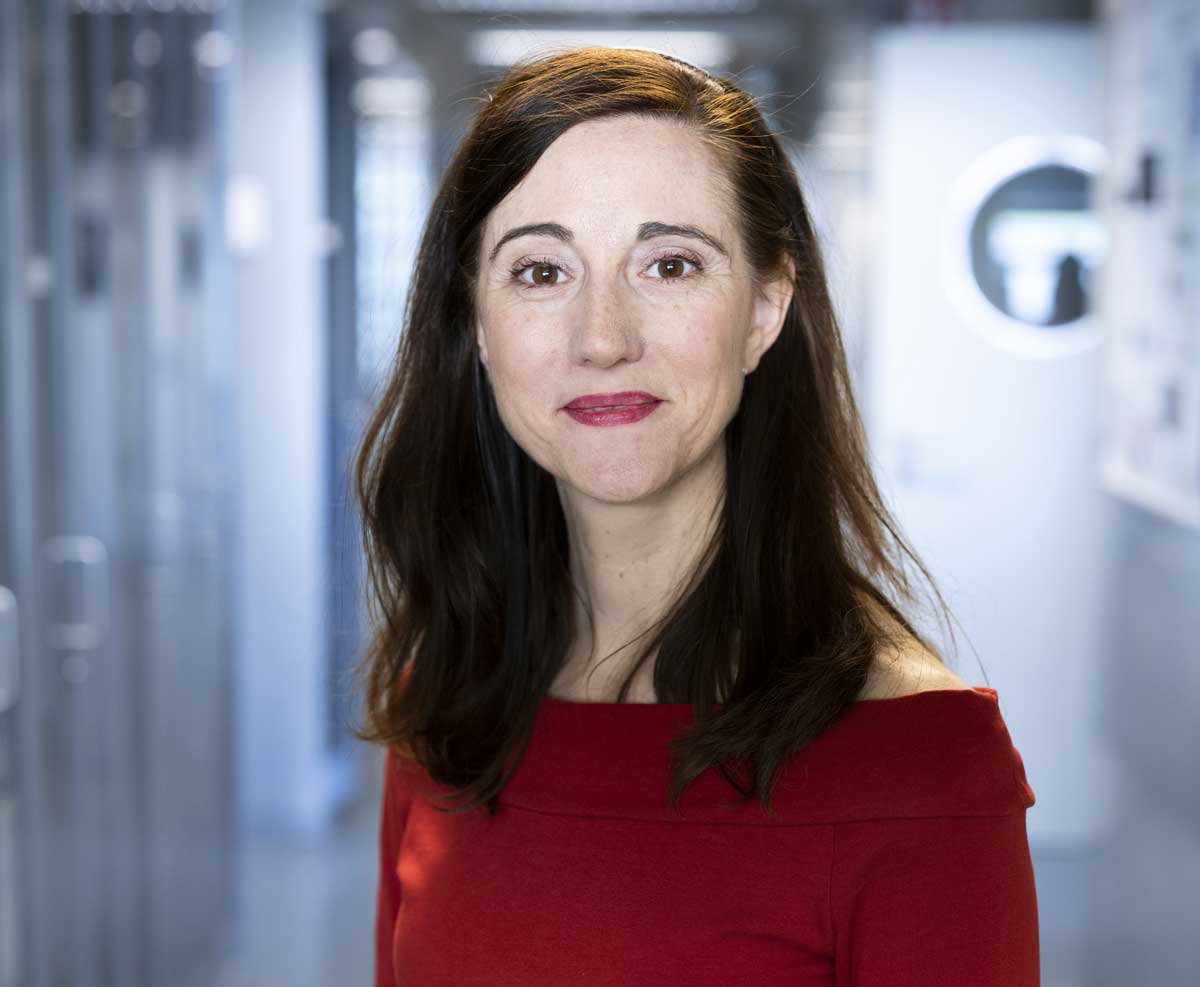
© Sven Döring
November 2024
Meritxell Huch, Director at the MPI-CBG receives the prestigious Otto Bayer Award from the Bayer Foundation for her pioneering research on human organoids. Her research has significantly advanced the use of organoid models in drug discovery, screening, and disease modeling for personalized medicine.

October 2024
The renowned US scientist Eugene Myers has been honored with the Order of Merit of the Free State of Saxony. Myers was founding director of the Center for Systems Biology Dresden (CSBD) in 2012 and was director at the MPI-CBG. Under his leadership, the CSBD – an initiative of the Max Planck Society together with the TU Dresden – developed into a world-leading center for systems biology in just a few years. The mathematician is one of the pioneers in the field of bioinformatics, and his scientific work and the BLAST algorithm, which he co-developed, were crucial to the decoding of the human genome.
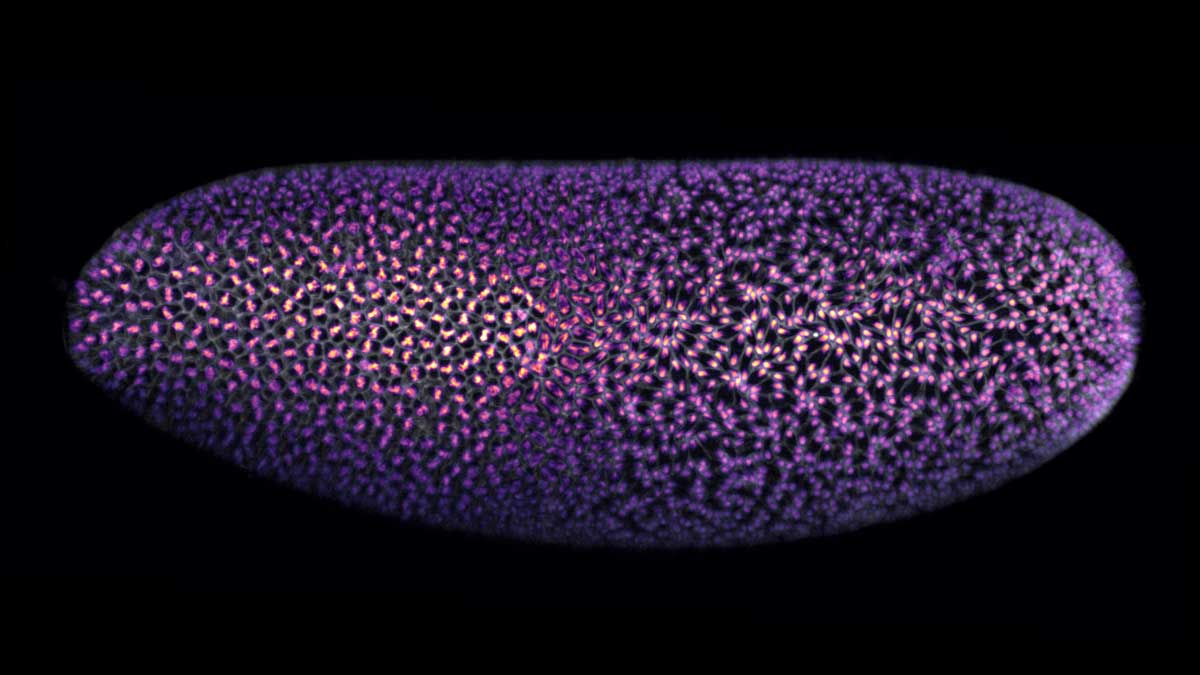
September 2024
Bruno Vellutini, a postdoctoral researcher in the group of Pavel Tomancak at the MPI-CBG received this year’s first place prize in the 14th Annual Nikon Small World in Motion Competition. His video reveals the dynamic processes of fly embryogenesis, crucial for uncovering genetic pathways that mirror those in humans and other mammals, with applications for cancer research, birth defects, and potential treatment development.
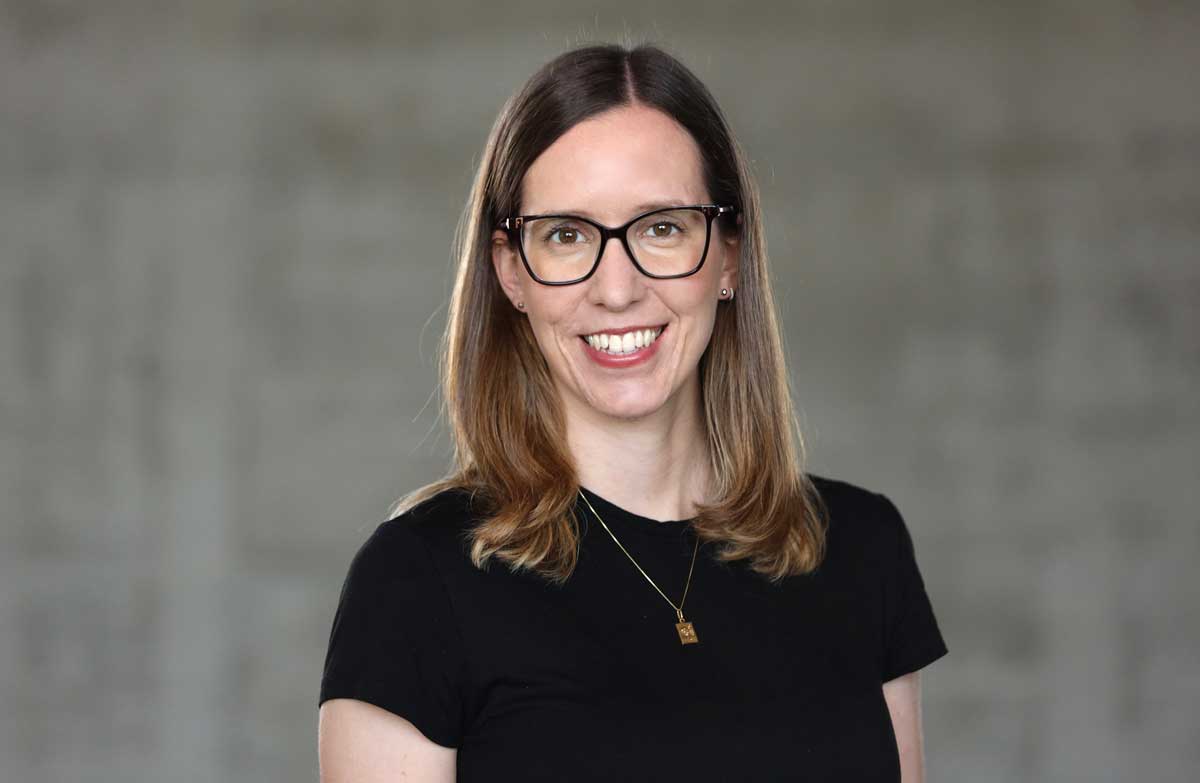
August 2024
The German Stem Cell Network (GSCN) announced the GSCN Awards 2024. One of the awardees is Claudia Gerri, research group leader at the MPI-CBG, who received the GSCN 2024 Young Investigator Award for her research at the interface between fetus and mother in various species.
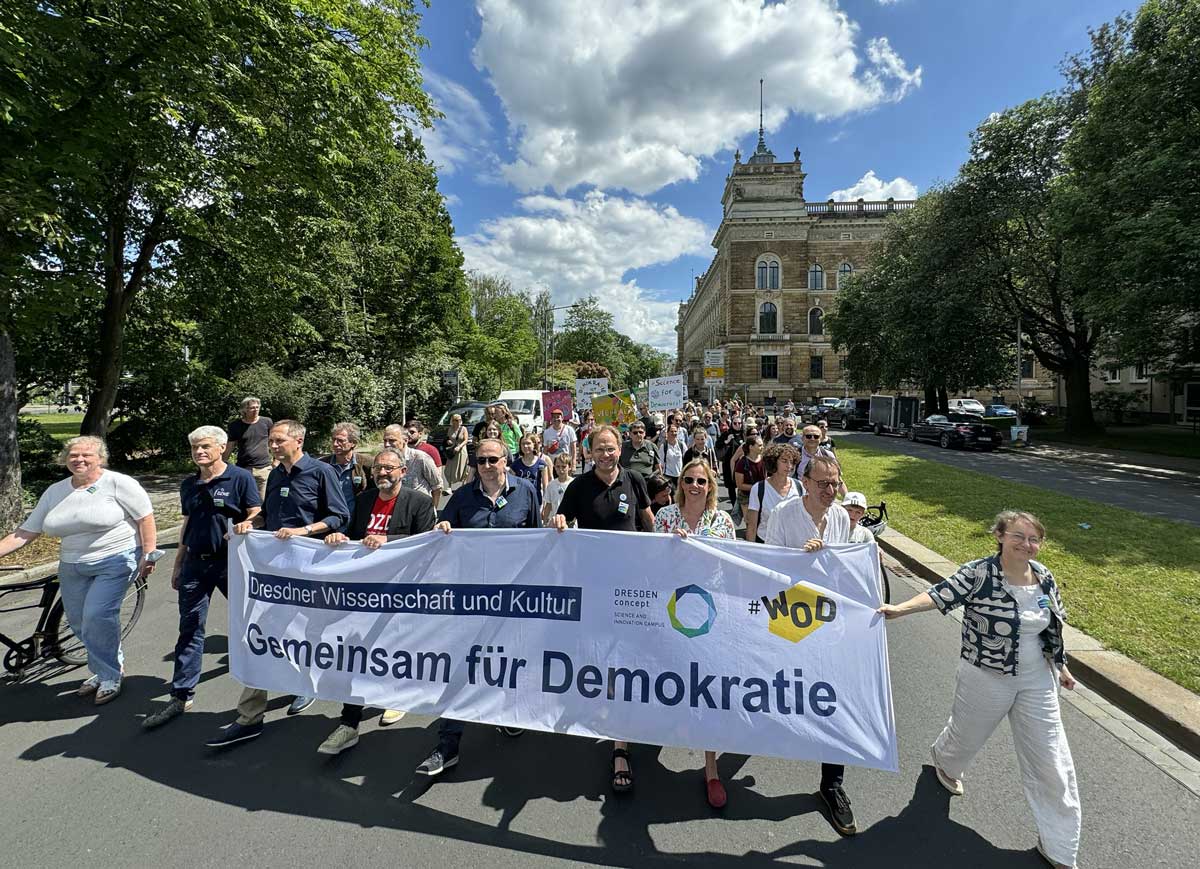
May 2024
On May 25, 2024, around 2,500 people gathered on Dresden’s Altmarkt to send a strong signal for the value of democracy and a free and democratic society and to celebrate a peaceful and happy festival of democracy. It was a first-time event of this kind in Germany. More than 60 institutions from science, art, and culture in Dresden - including the TUD Dresden University of Technology and the MPI-CBG under the umbrella of DRESDEN-concept e. V. and the #WOD Weltoffenes Dresden Alliance - invited everyone to join in.
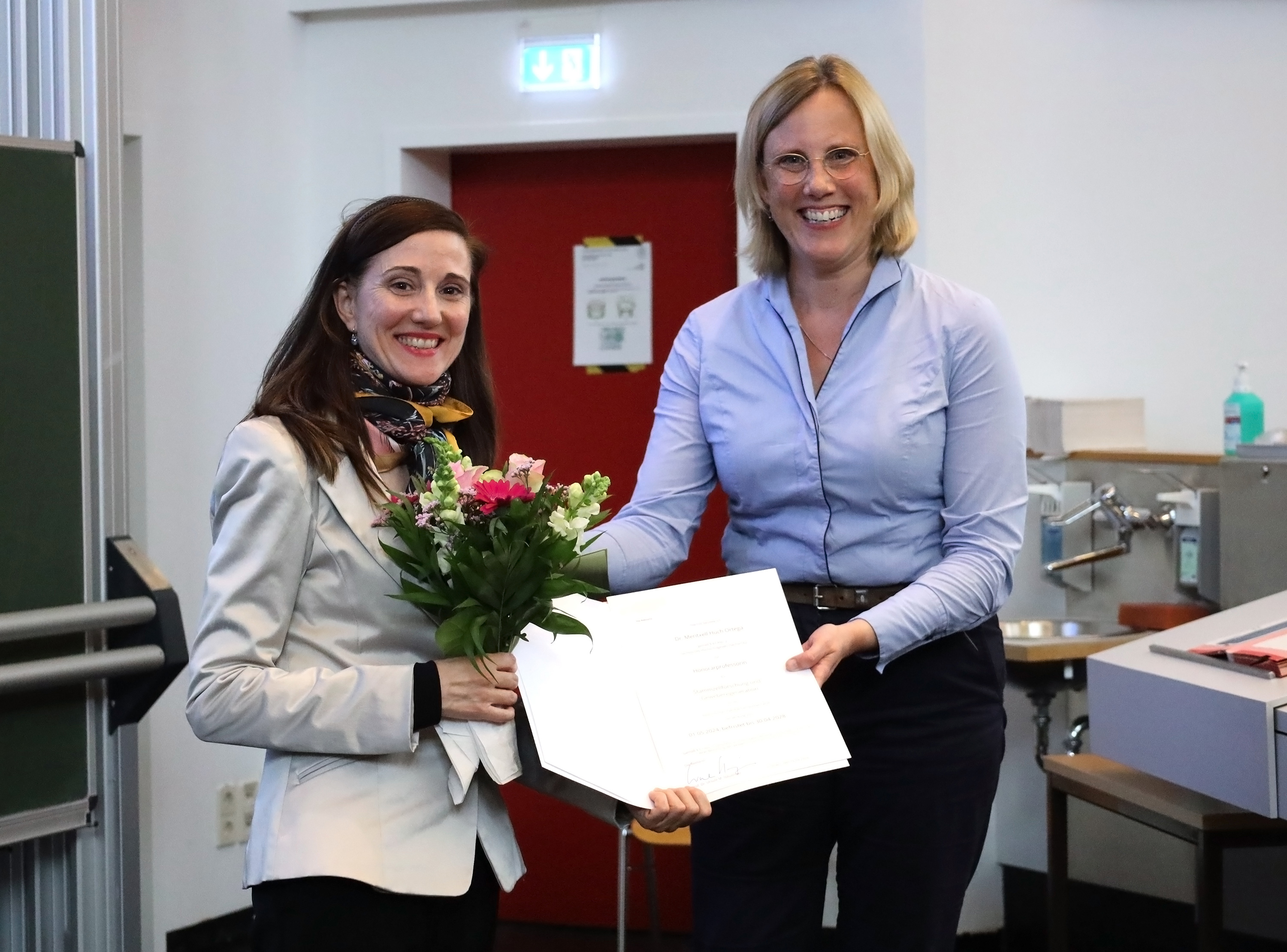
May 2024
At the faculty council meeting on May 29th, the Dean of the Medical Faculty at the TU Dresden, Prof. Dr. med. Dr. Esther Troost, officially presented Prof. Meritxell Huch, director at the MPI-CBG, to the faculty. Huch is a newly appointed honorary professor for stem cell research and tissue regeneration.
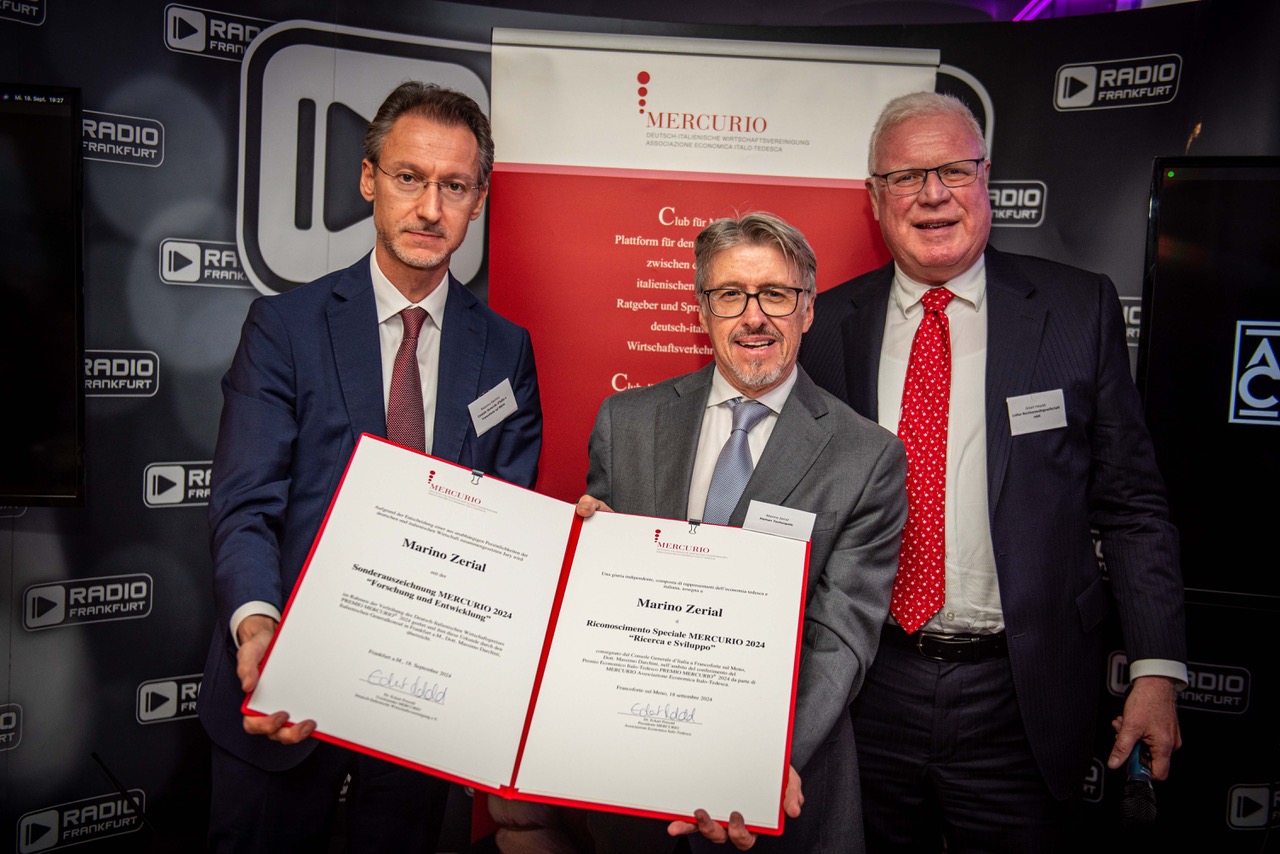
© ITKAM/Sauda
May 2024
The German National Academy of Sciences Leopoldina has elected the Dresden and Italian cell biologist Marino Zerial as one of its members. He is one of the founding directors of the MPI-CBG and is also the director of the Human Technopole in Milan, Italy. The German National Academy of Sciences Leopoldina brings together researchers with special expertise in their respective fields. Election to the ranks of the Leopoldina is considered one of the highest honors for scientists.
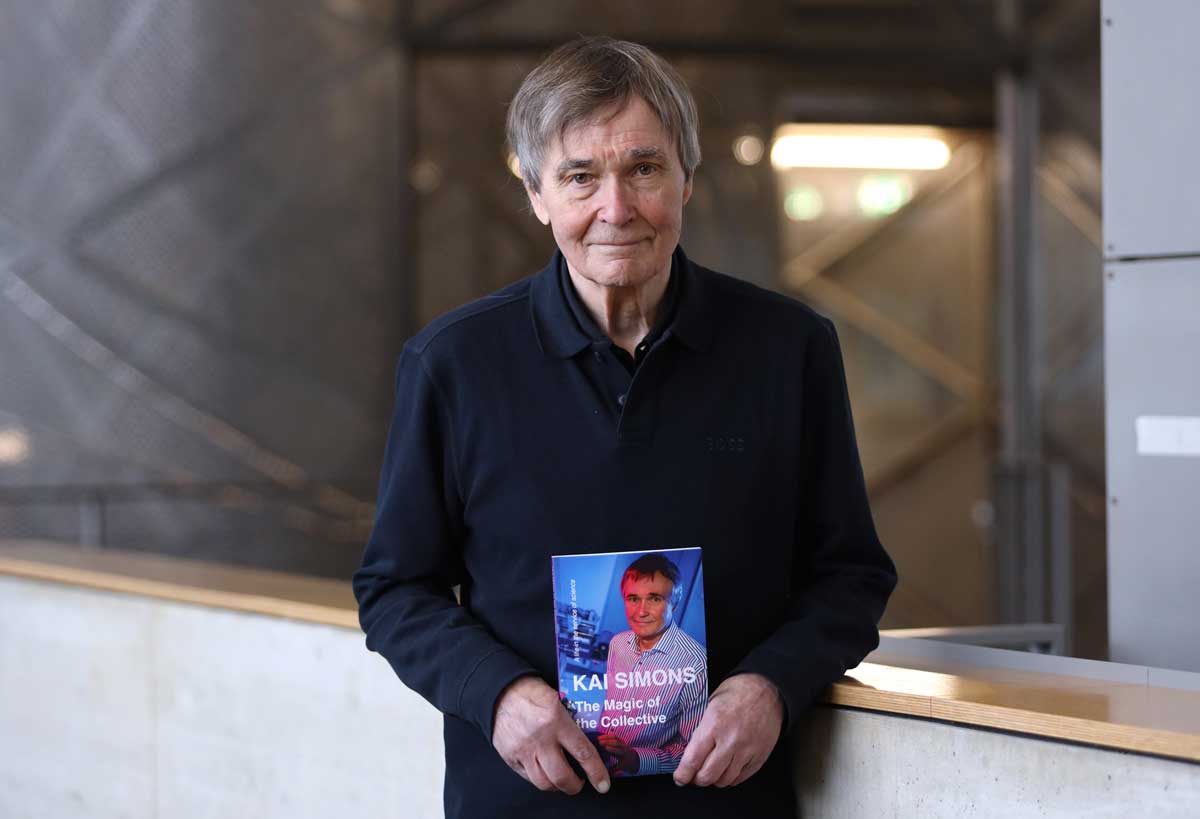
March 2024
Kai Simons, one of the founding directors of the MPI-CBG, published his autobiography “The Magic of the Collective.” His memoir is a reflection on many aspects of modern scientific research, including the current dominance of competition over collaboration, scientific fraud and whistleblowing, and the dichotomy between science and the arts.
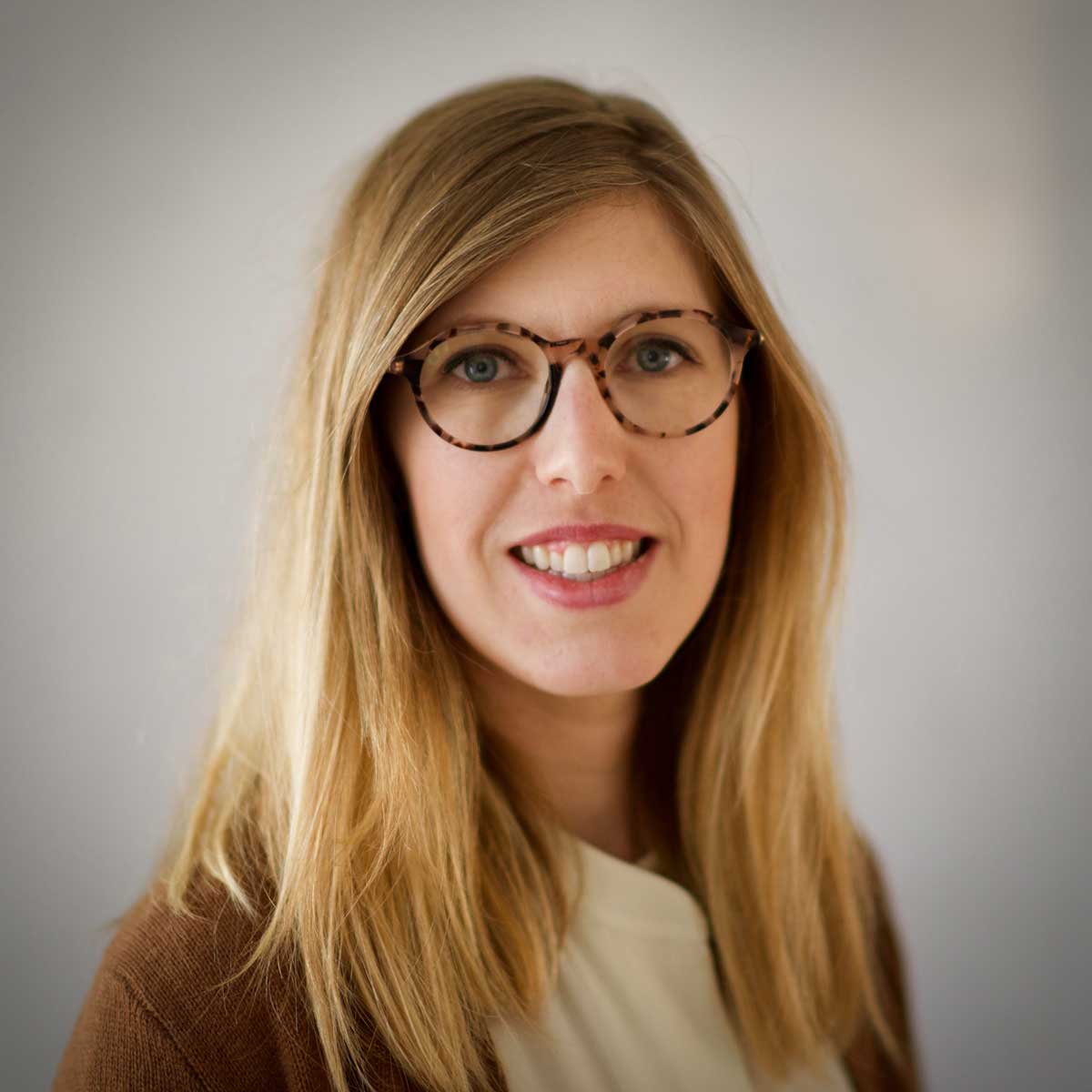
© Z Goriely
October 2023
Heather Harrington joins the team of directors. In her position, she will also lead the interinstitutional Center for Systems Biology Dresden (CSBD) together with partners from the TU Dresden and the MPI for the Physics of Complex Systems. Her vision is to create new mathematical approaches to glean additional information about living systems and understand how they self-organize across scales. She is also a Professor of Mathematics at the Mathematical Institute at the University of Oxford, UK, and a Fellow of St John’s College Oxford.
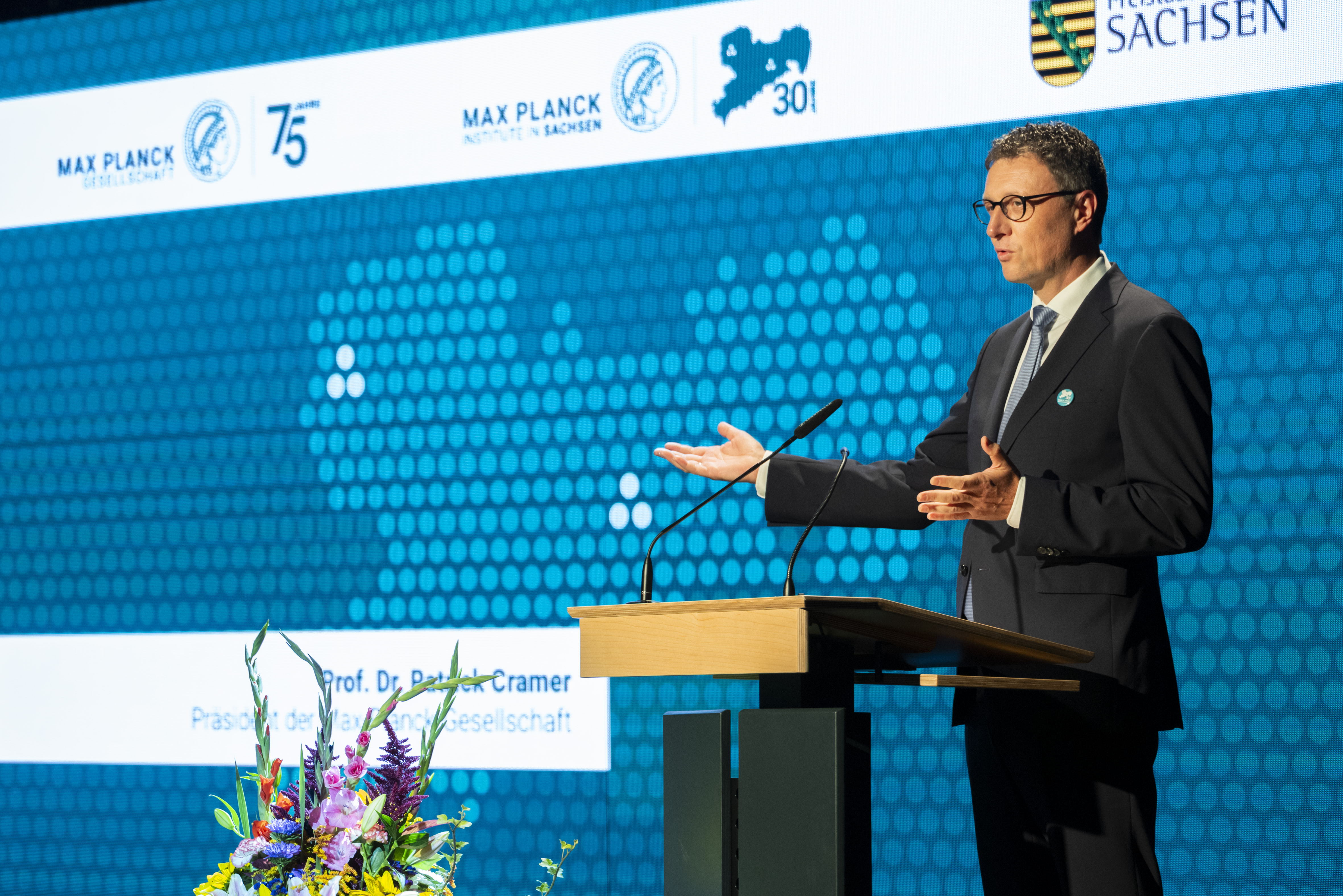
September 2023
The first Max Planck Institute in Saxony was founded in 1993. Five more followed. To celebrate this there were several joint events of the institutes for the public in September 2023. On September 4, 2023, Saxon Minister President Michael Kretschmer and Max Planck President Patrick Cramer co-hosted a ceremonial event at the Kulturpalast in Dresden, commemorating the 30-year success story of the Max Planck Society in Leipzig and Dresden. Nobel Laureate Svante Pääbo from the Max Planck Institute for Evolutionary Anthropology in Leipzig talked about his Neanderthal research.
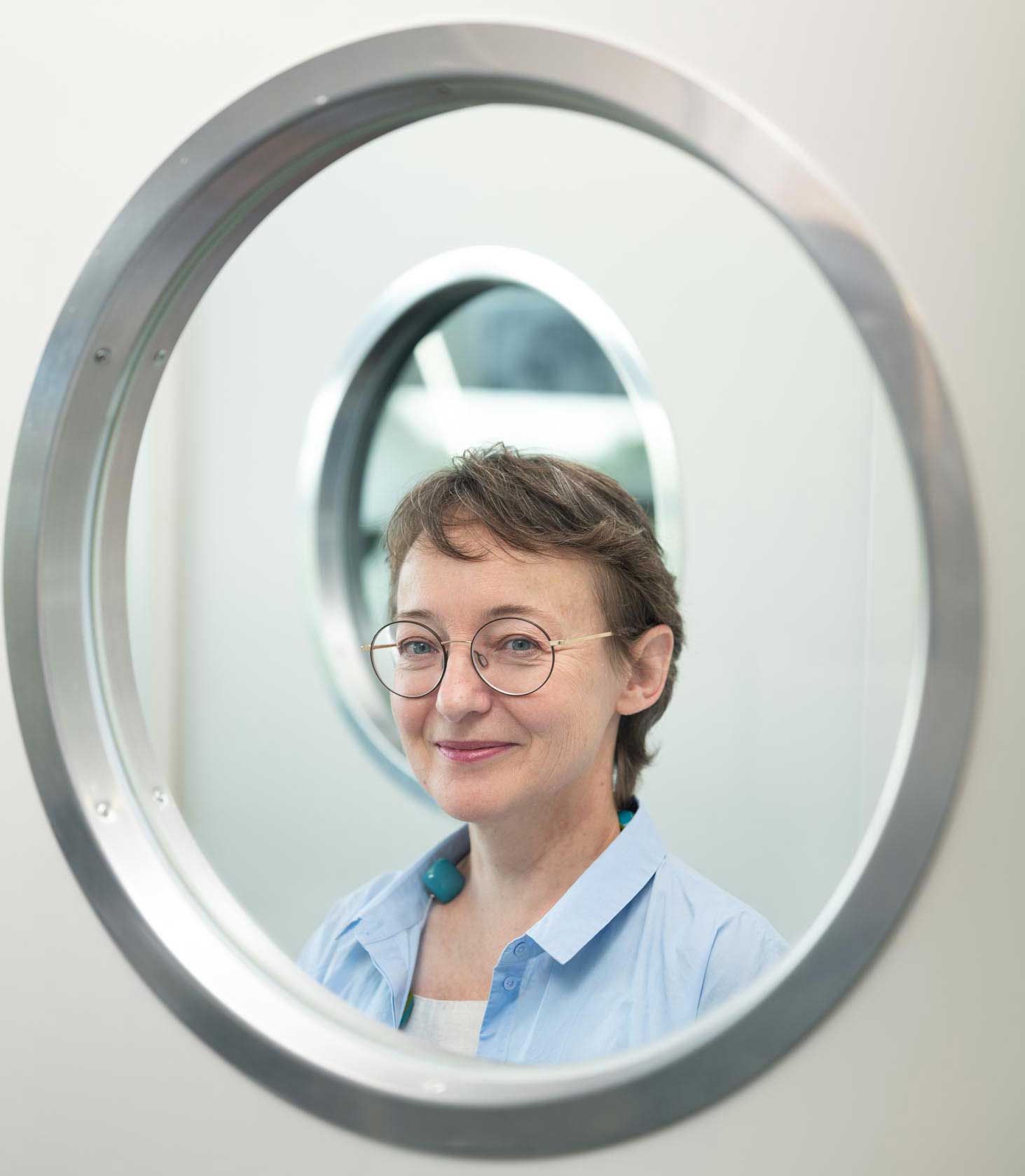
August 2023
Anne Grapin-Botton, Managing Director at the MPI-CBG, receives the GSCN 2023 Hilde Mangold Award from the German Stem Cell Network. This award recognizes outstanding female stem cell researchers on their way to expand basic research and open new avenues for therapeutic opportunities.
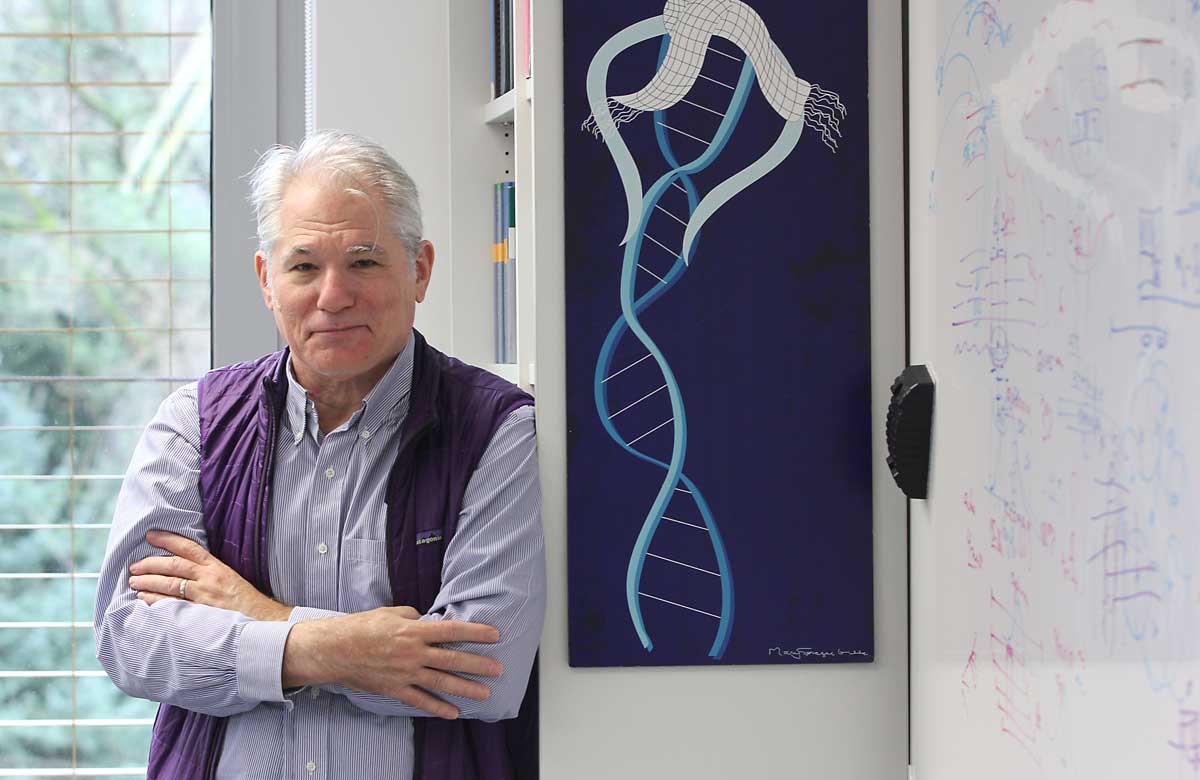
May 2023
The Director Emeritus at MPI-CBG and the Center for Systems Biology Dresden (CSBD) receives the highest alumni honor of the California Institute of Technology for having revolutionized the bioinformatics industry.
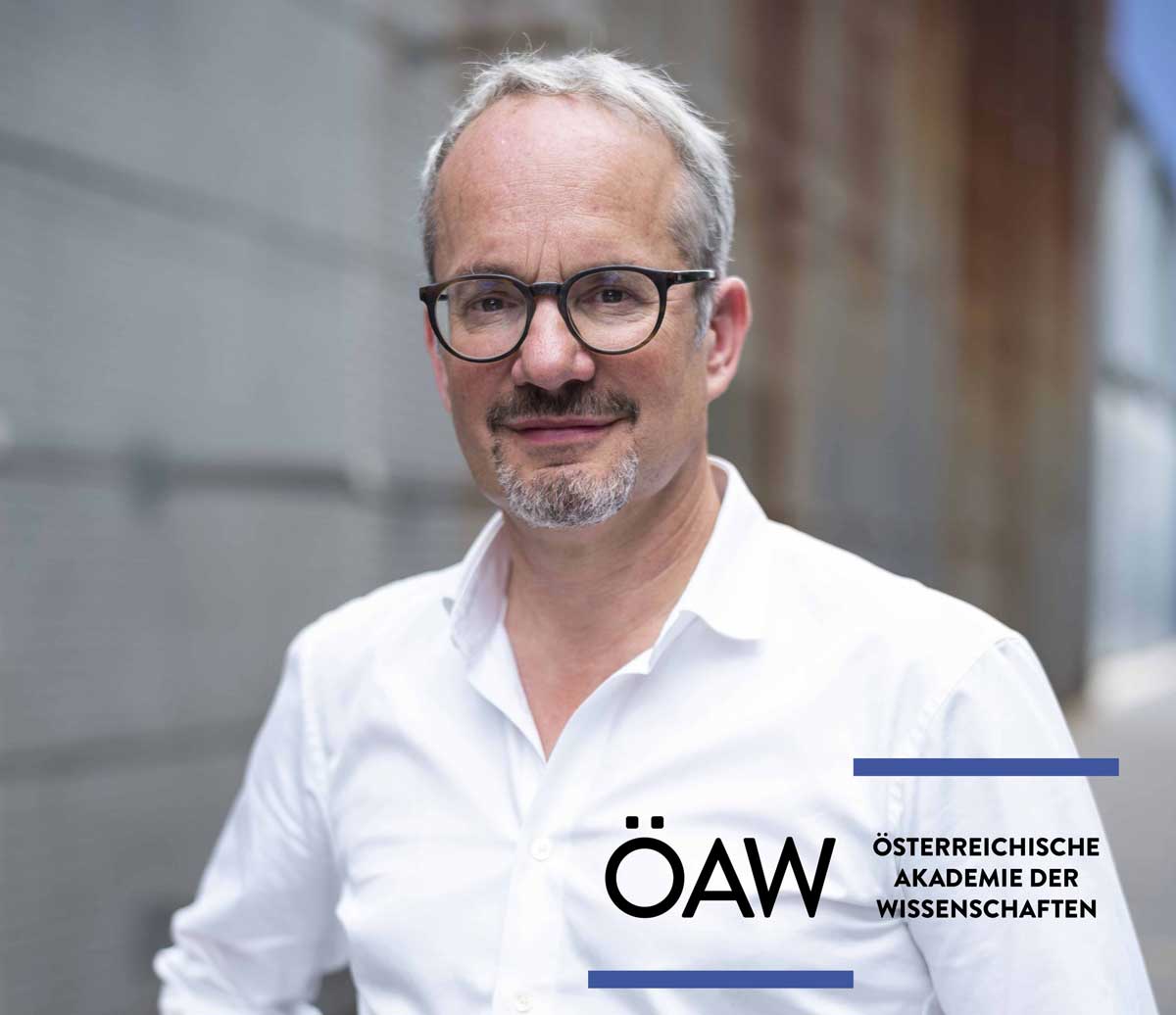
April 2023
The Austrian Academy of Sciences (OeAW) elected 31 researchers as new members of the Academy. In addition to the four full members, the learned society elected 15 corresponding members and twelve members to the Young Academy. Anthony Hyman, director of the MPI-CBG, was elected as a new corresponding member abroad of the Mathematics and the Natural Sciences Division to the Academy.
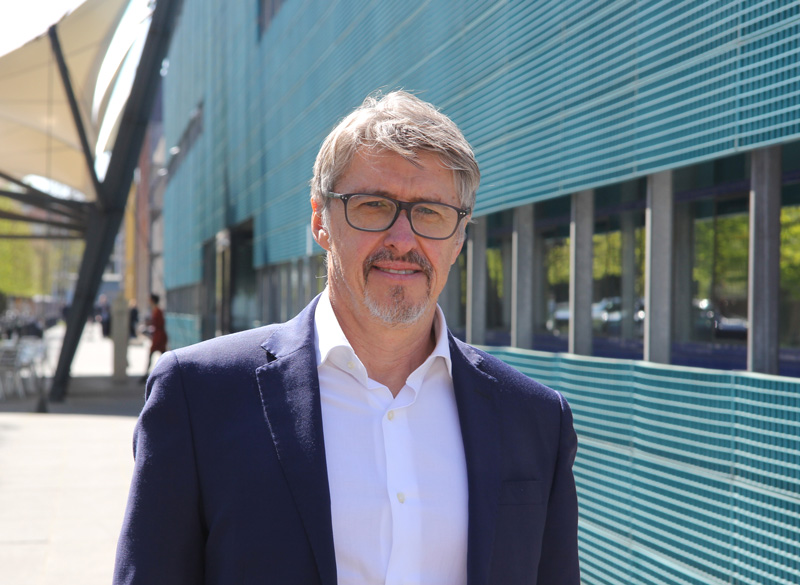
March 2023
Marino Zerial, one of the MPI-CBG directors has been appointed as the new director of the Human Technopole in Milan, Italy. Italian by birth and German by adoption, Marino Zerial is the second director of Human Technopole, Italy’s new research institute for life sciences.
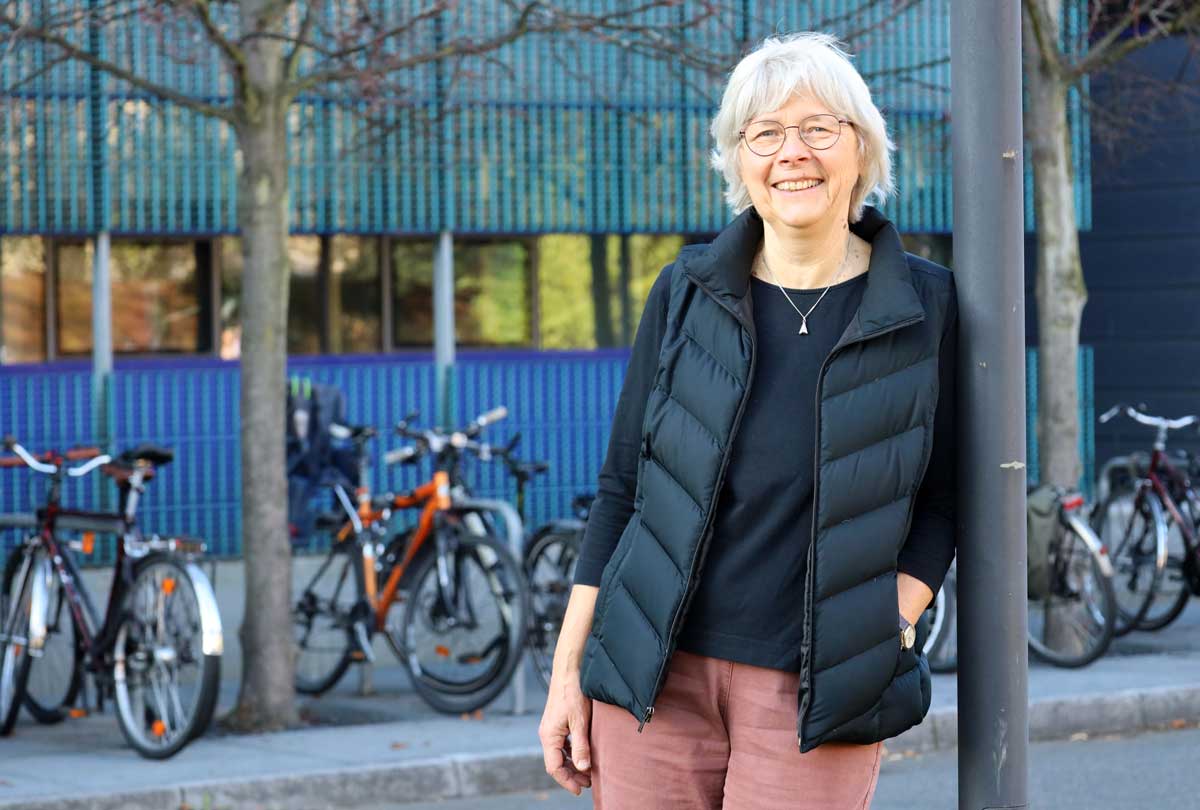
November 2022
The MPI-CBG director emerita is elected into INSA for her pioneering contribution to science and long-standing collaborations with the scientific community in India.
October 2022
Kai Simons, Director Emeritus at MPI-CBG and Andrej Shevchenko, research group leader at MPI-CBG, as well as Andreas Greinacher from Greifswald University Medical Department receive the Biochemical Analytics Prize 2022 of the German Society for Clinical Chemistry and Laboratory Medicine e. V. (DGKL) for the development of a high-resolution quantitative lipid profiling and the discovery of the causes of vaccine-induced cerebral vein thrombosis.
September 2022
Meritxell Huch, director at the MPI-CBG), receives the GSCN 2022 Hilde Mangold Award for her pioneering research on organoids from several organs including stomach, liver and pancreas, both from animal models and human tissues.
September 2022
Ronald Naumann, the head of the MPI-CBG transgenic core facility, receives the 3Rs Prize of the International Society for Transgenic Technologies for a method to reduce the number of experimental animals.
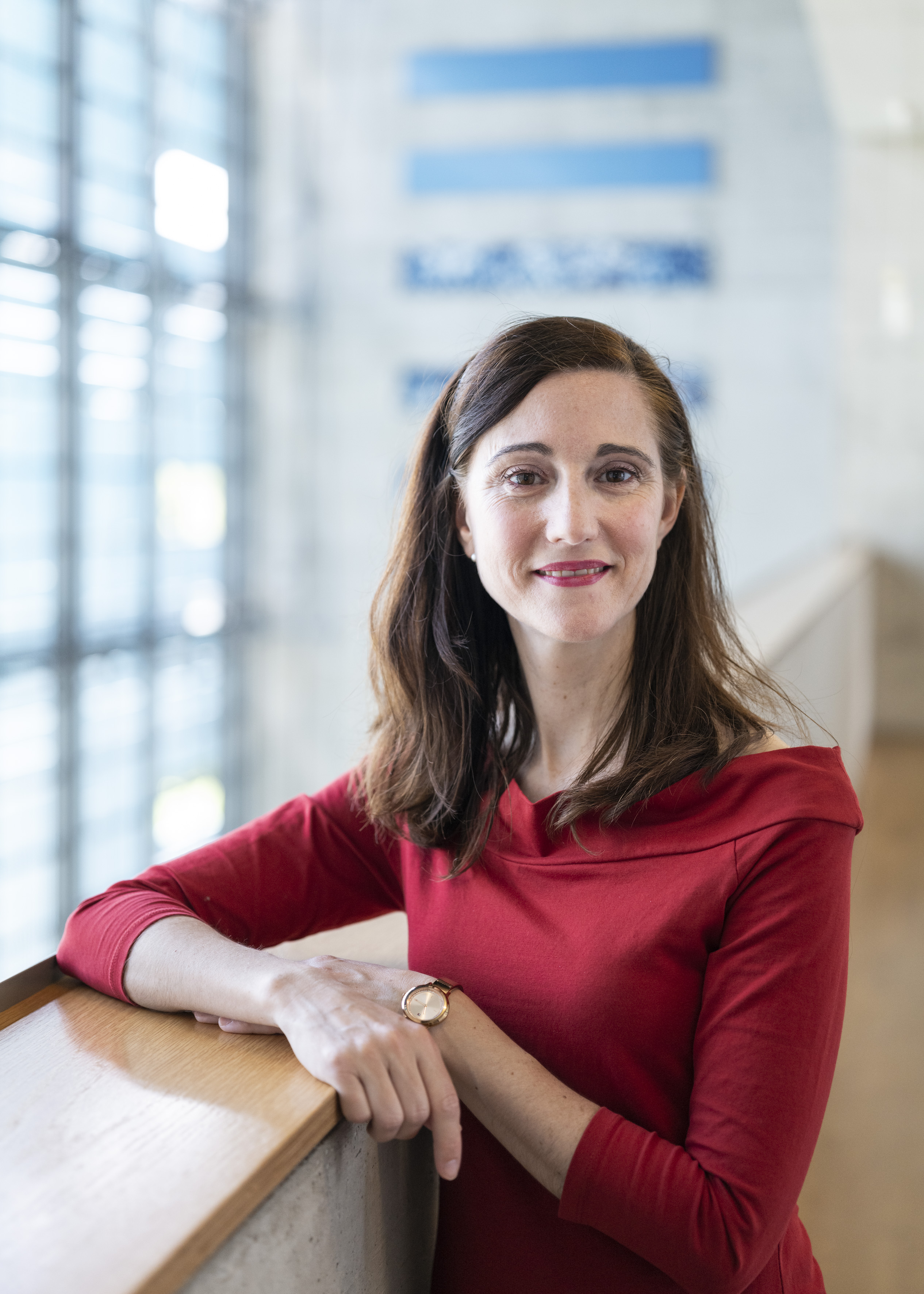
July 2022
Meritxell Huch joins the MPI-CBG team of directors. She is one of the first recipients of the Lise Meitner Excellence Program from the Max Planck Society, aimed at rising scientific stars in a research field. In September, she receives the 2022 Hilde Mangold Award of the German Stem Cell Network for her pioneering research on organoids from several organs including stomach, liver and pancreas, both from animal models and human tissues.
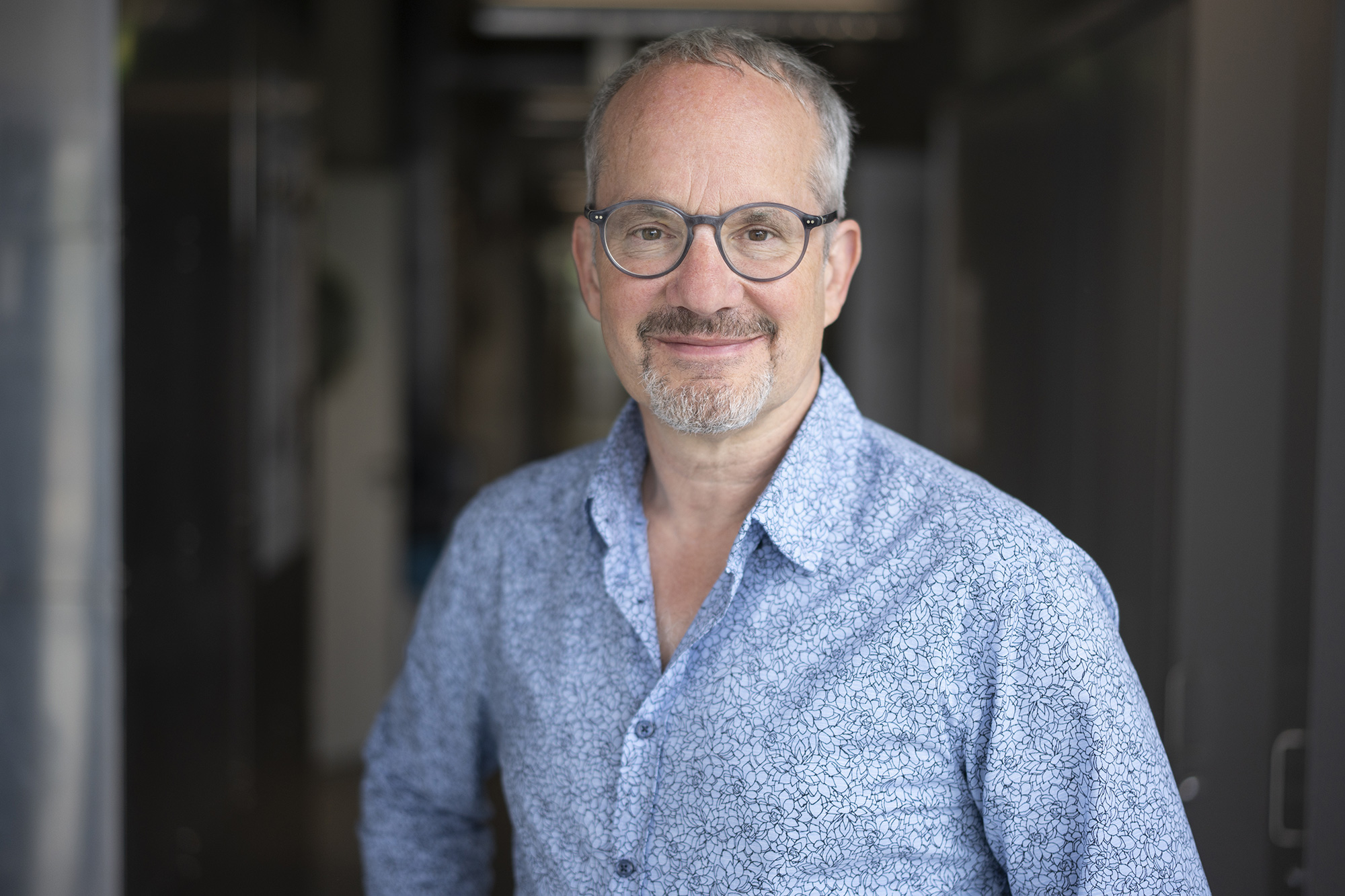
June / September 2022
In June, the MPI-CBG director is awarded with the Körber European Science Prize 2022, endowed with one million euros for for the discovery of condensates - cell droplets without a membrane, a new hope for the treatment of neurodegenerative diseases. In September, he receives the 2023 Breakthrough Prize in Life Sciences together with Clifford Brangwynne. The Breakthrough Prize, renowned as the “Oscars of Science,” recognizes the world’s top scientists and groundbreaking discoveries.
6 May 2022
Eugene Myers, Director Emeritus at MPI-CBG and the Center for Systems Biology Dresden (CSBD), and Webb Miller, professor in the department of biology and the department of computer science and engineering at The Pennsylvania State University, received the first, newly created IEEE Frances E. Allen Medal at the 2022 IEEE Honors Ceremony on May 6. The medal is awarded for their pioneering contributions to sequence analysis algorithms and their applications to biosequence search, genome sequencing, and comparative genome analyses.
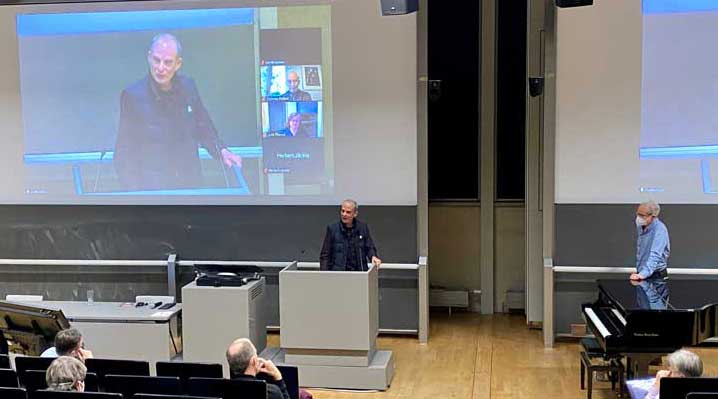
01 December 2021
Actin, Myosins and other tales Symposium on the occasion of the 60th birthday of Ivan Baines, the COO at MPI-CBG.
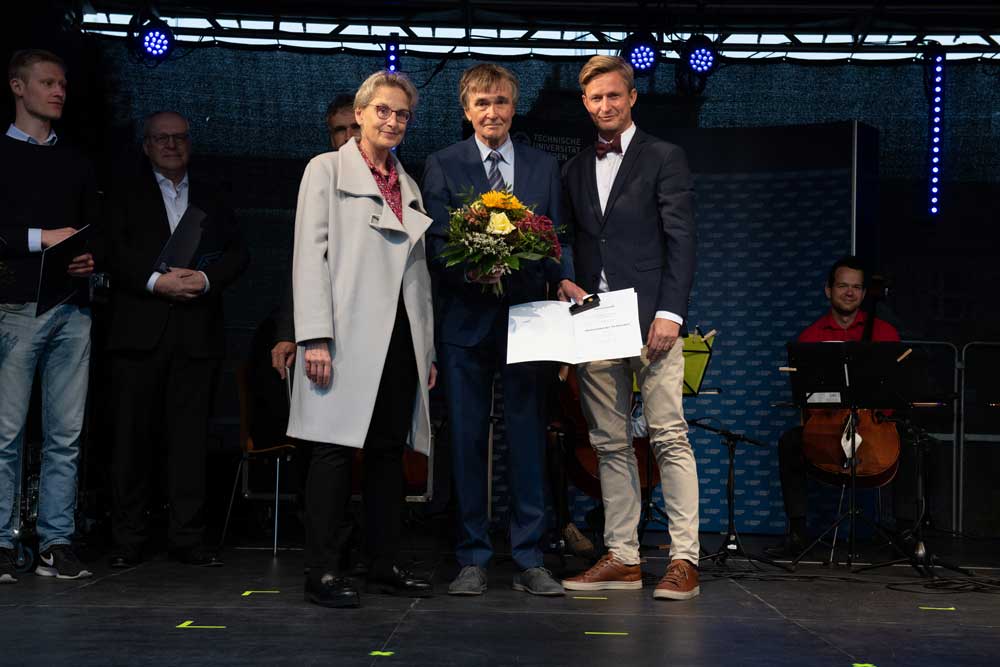
© TU Dresden / Michael Kretzschmar
October 2021
The TU Dresden honored Kai Simons, one of the founding directors of the MPI-CBG, with the Badge of Honour. Kai led the institute as its first managing director and has had an impact far beyond its borders as a tireless driving force for the life sciences and biotechnologies in Dresden. As a professor in the Faculty of Medicine at TU Dresden, he played a key role in planning and shaping the teaching of the life sciences.
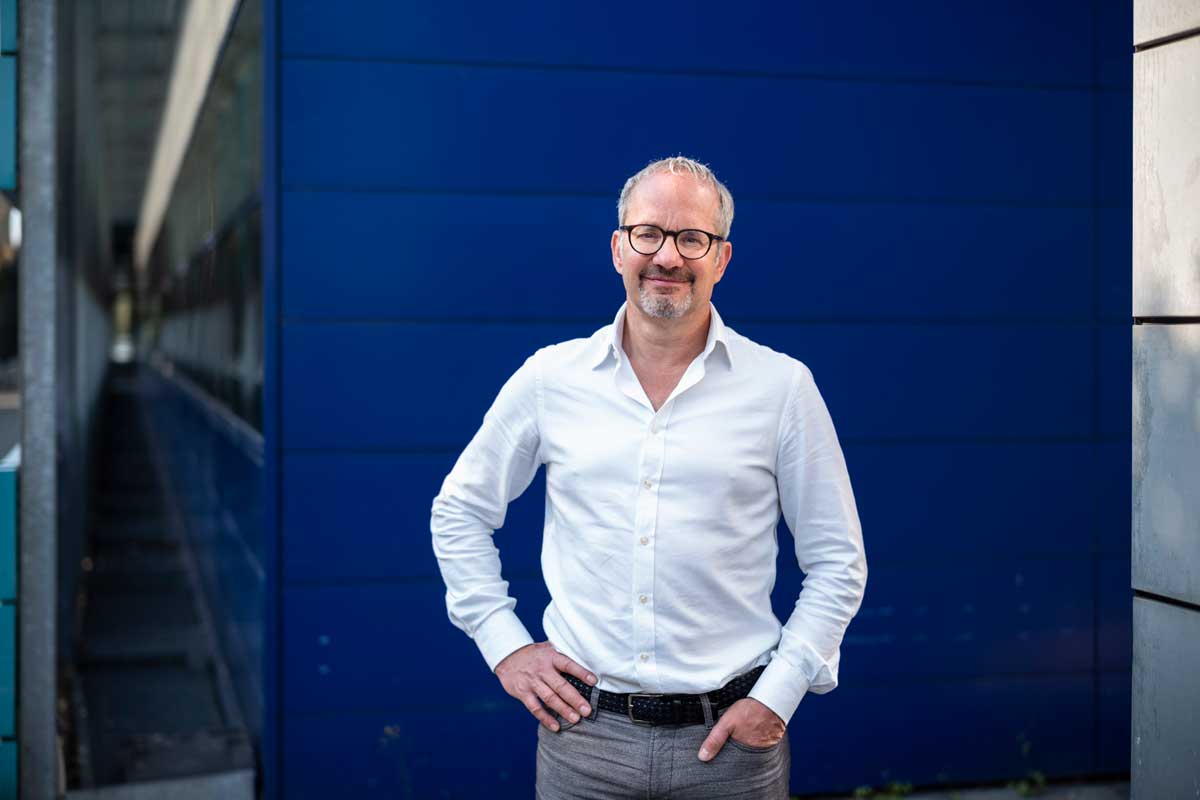
© Sven Döring
September 2021
The German National Academy of Sciences Leopoldina has elected Anthony Hyman, director at the MPI-CBG, as one of its members. The German National Academy of Sciences Leopoldina brings together researchers with special expertise in their respective fields. Election to the ranks of the Leopoldina is considered one of the highest honors for scientists.

01 July 2021
The MPI-CBG one of the first signing members of the initiative of the DFG and "Tierversuche verstehen" for open communication about animals in research.
22 April 2021
Stefan Golfier, PhD student at MPI-CBG, wins the FameLab Germany 2021, the world’s leading science communication competition.
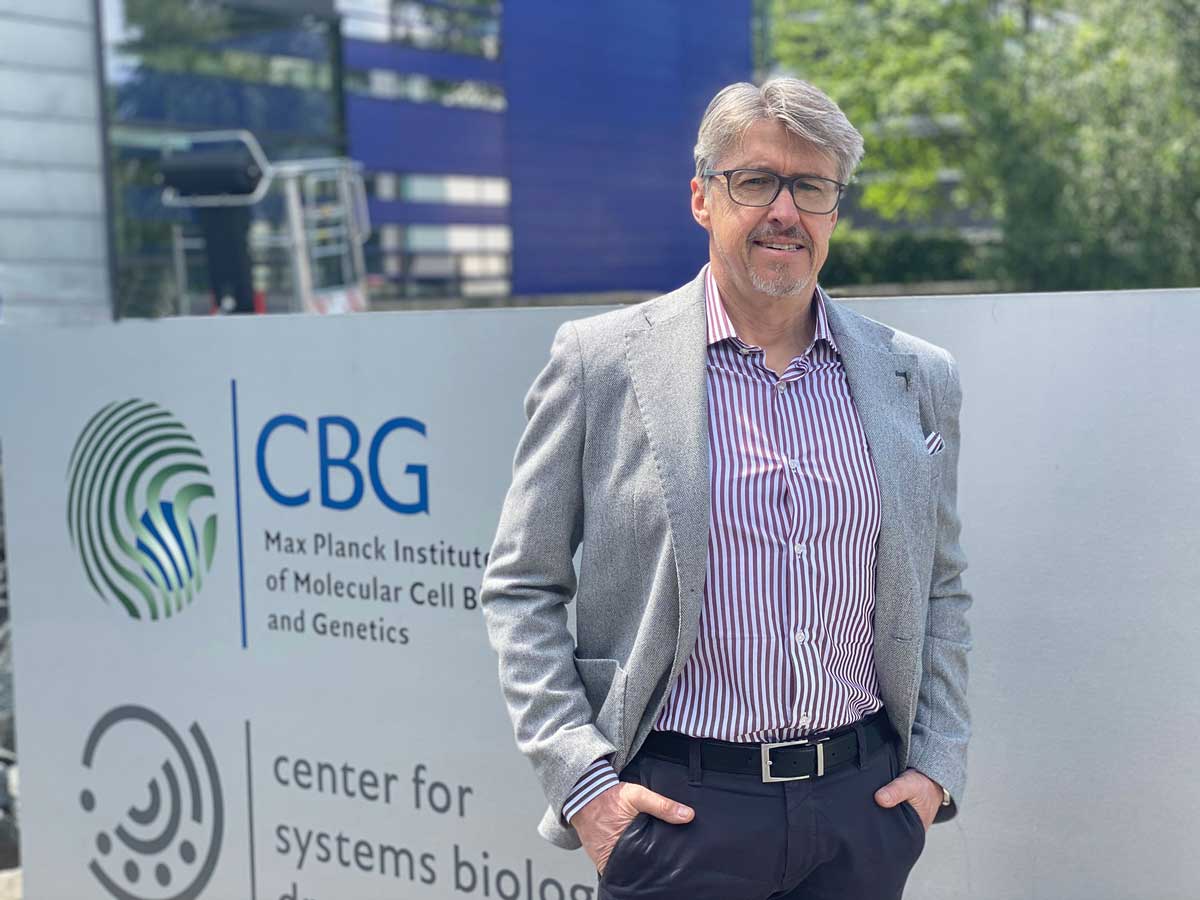
April 2021
Marino Zerial, director at MPI-CBG, has been elected International Honorary Member of the American Academy of Arts and Sciences.
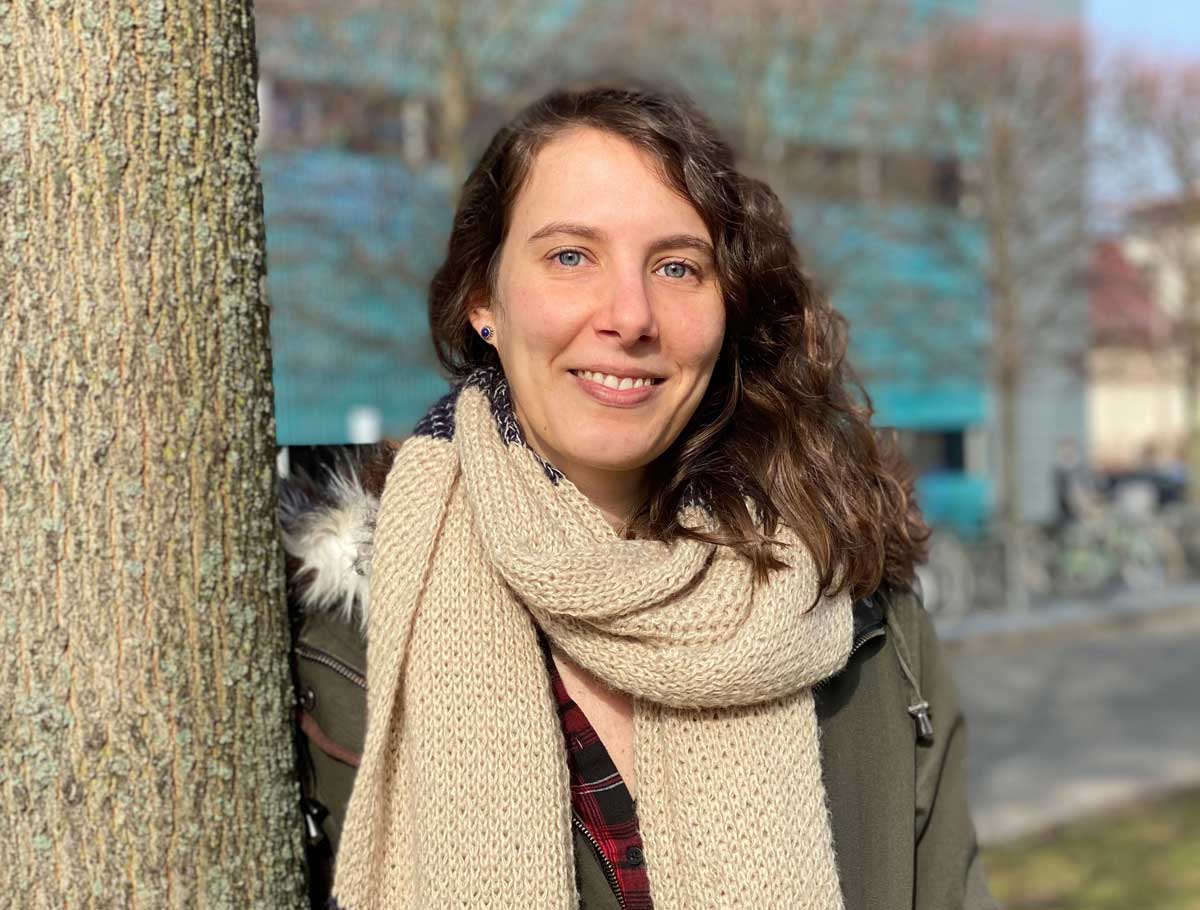
February 2021
Rita Mateus, is newly appointed and first DRESDEN-concept Research Group Leader. Her position is joint between the Cluster of Excellence Physics of Life (PoL) at the TU Dresden and the MPI-CBG with tenure track to a TU Dresden Professorship. Rita and her research lab will work with zebrafish in order to understand how animals control their organ size.
05 November 2020
Anthony Hyman and Clifford Brangwynne receive this award for the discovery of phase-separated macromolecule condensates.
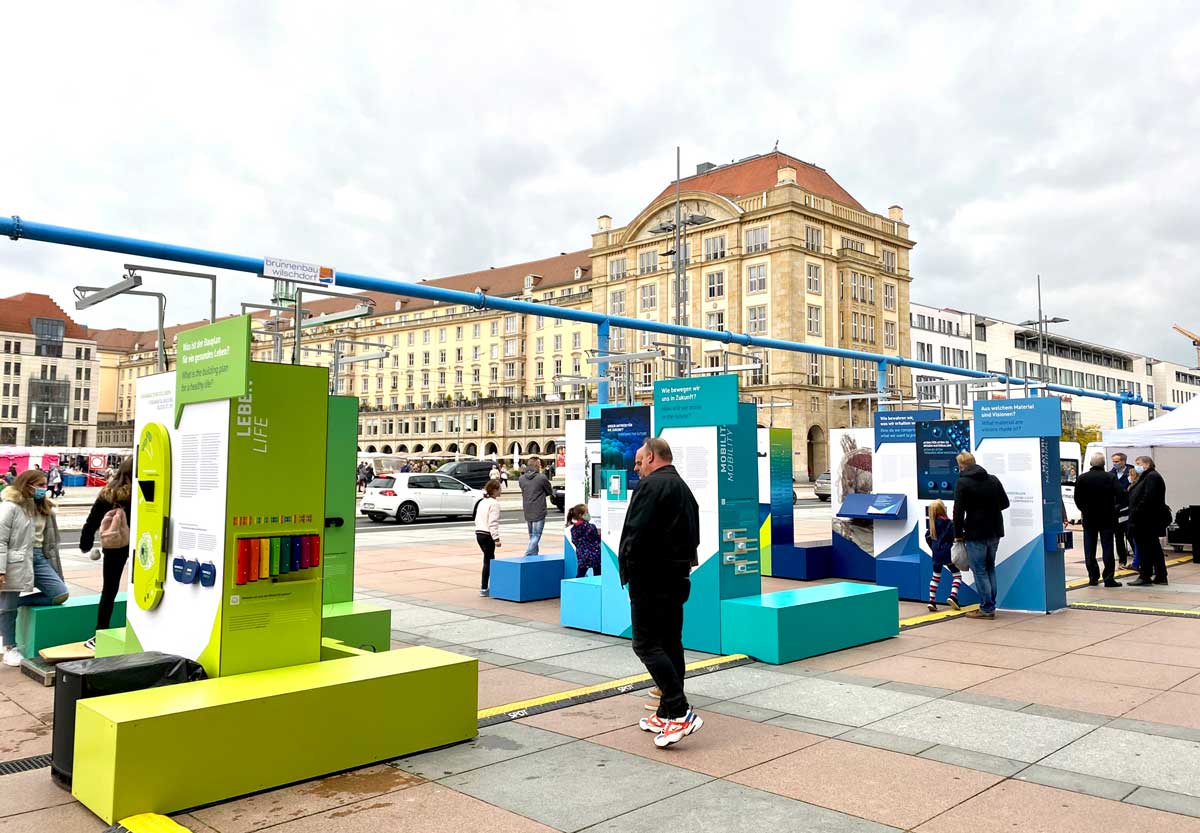
October 2020
The DRESDEN-concept outdoor science exhibition opens in the inner city of Dresden. The MPI-CBG presents its research together with other Dresden life science institutes.
13 March 2020
On close of business on Friday the 13th of March, MPI-CBG shut its doors and transitioned to a fully virtual work place with only emergency operations. This was done in order to protect the employees and to slow the rate of spread of the virus, particularly given the highly international nature of scientific research.
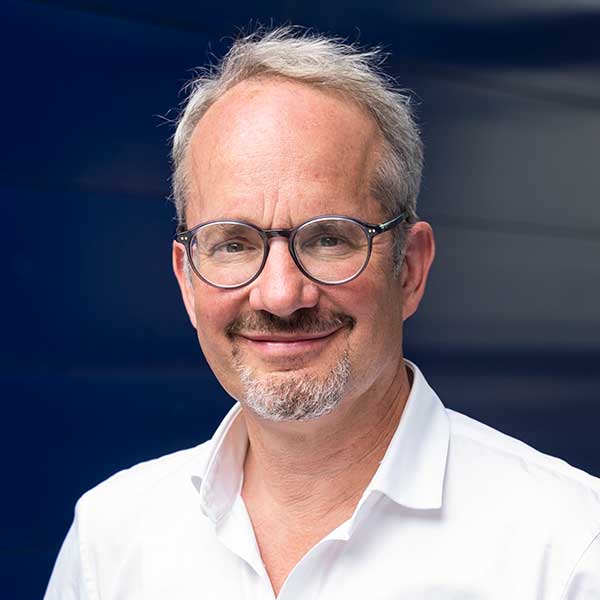
© Sven Döring
February / April 2020
MPI-CBG Director Anthony Hyman was awarded the 2020 Wiley Prize in Biomedical Sciences for determining how cells can compartmentalize processes without the use of membranes.
The 2020 NOMIS Distinguished Scientist and Scholar Award was presented to Tony Hyman in April 2020.
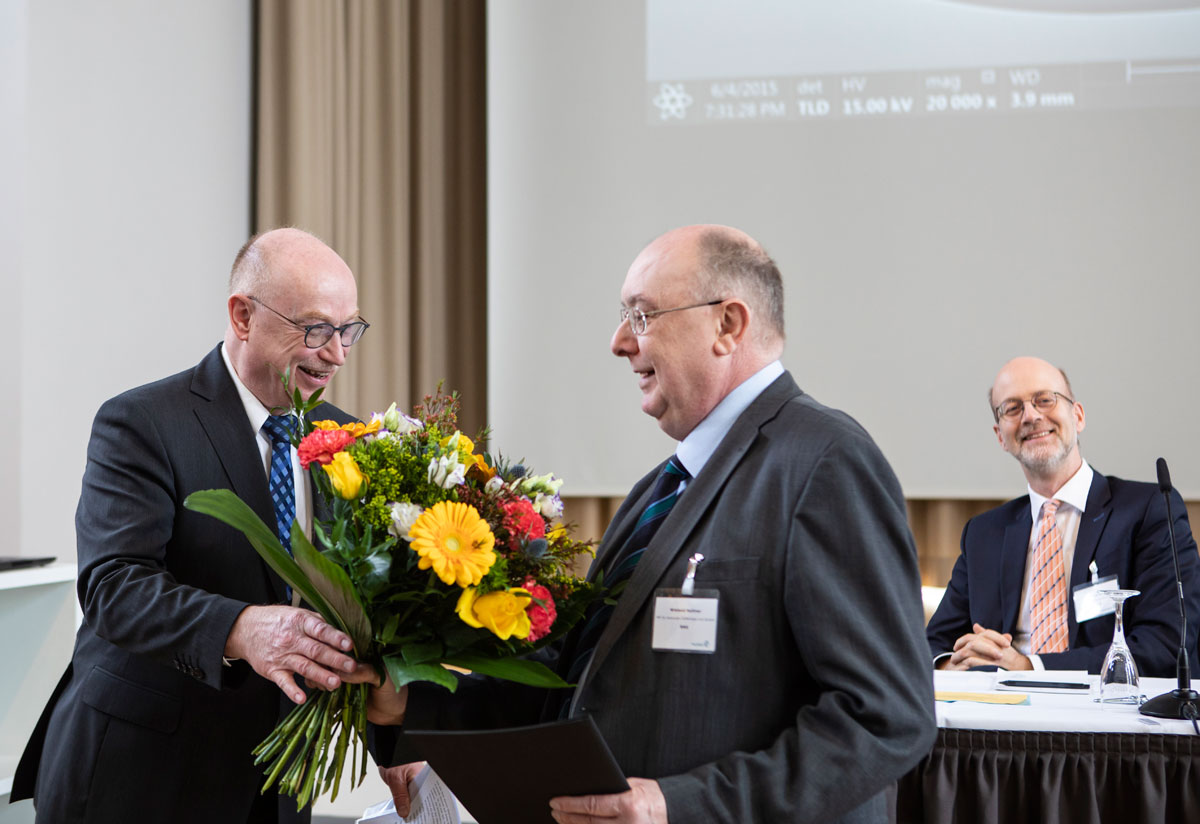
January / February 2020
At the TU Dresden's New Year's Reception on 13 January 2020, the Golden Badge of Honour was awarded for the first time to members of the TU Dresden who have made outstanding contributions to the university. One of the recipients of the Badge of Honour is Wieland Huttner.
This year's Communitas Prize for outstanding achievement in the Max Planck Society goes to Wieland Huttner, Director Emeritus at the MPI-CBG. The award ceremony took place on February 20 during the meeting of the Scientific Council.
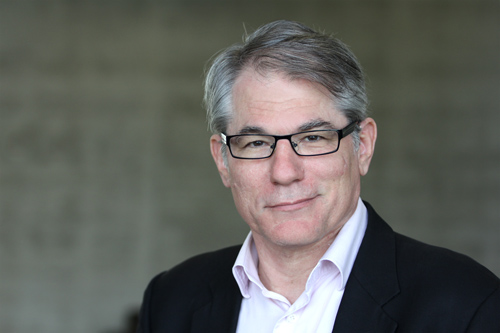
December 2019
Eugene Myers, director at the MPi-CBG, receives the “Royal Society Milner Award and Lecture 2019” at the Royal Society in London. The world's oldest independent scientific academy awards the bioinformatician with the Milner Award for “his development of computational techniques that have brought genome sequencing into everyday use, underpinned key biological sequencing tools, and made large scale analysis of biological images practical”.
25 – 26 November 2019
Symposium on the occasion of Gene Myers’ 65th birthday.
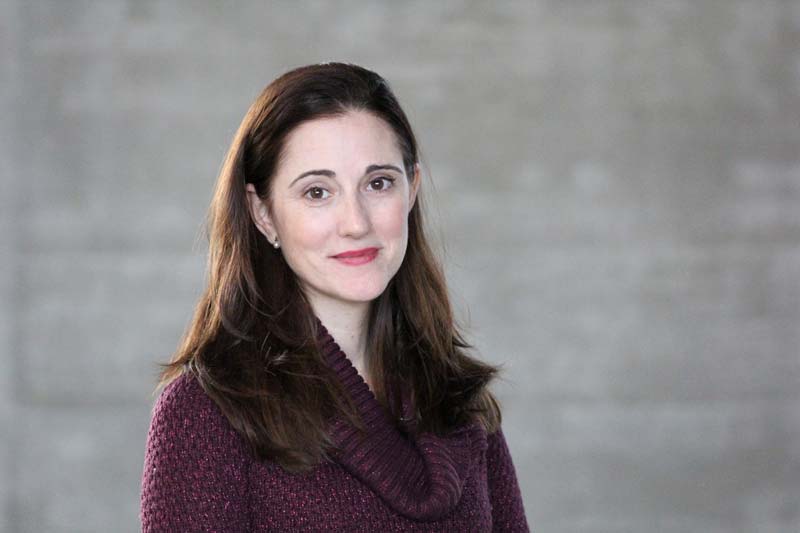
September 2019
Meritxell Huch a newly recruited research group leader at the MPI-CBG, received the BINDER Innovation Prize 2019. The award is given for outstanding cell biological research with a focus on cell culture or the use of cell cultures. Meritxell wins this year's award for her world-leading research on 'Liver organoids for the study of liver biology and disease’.
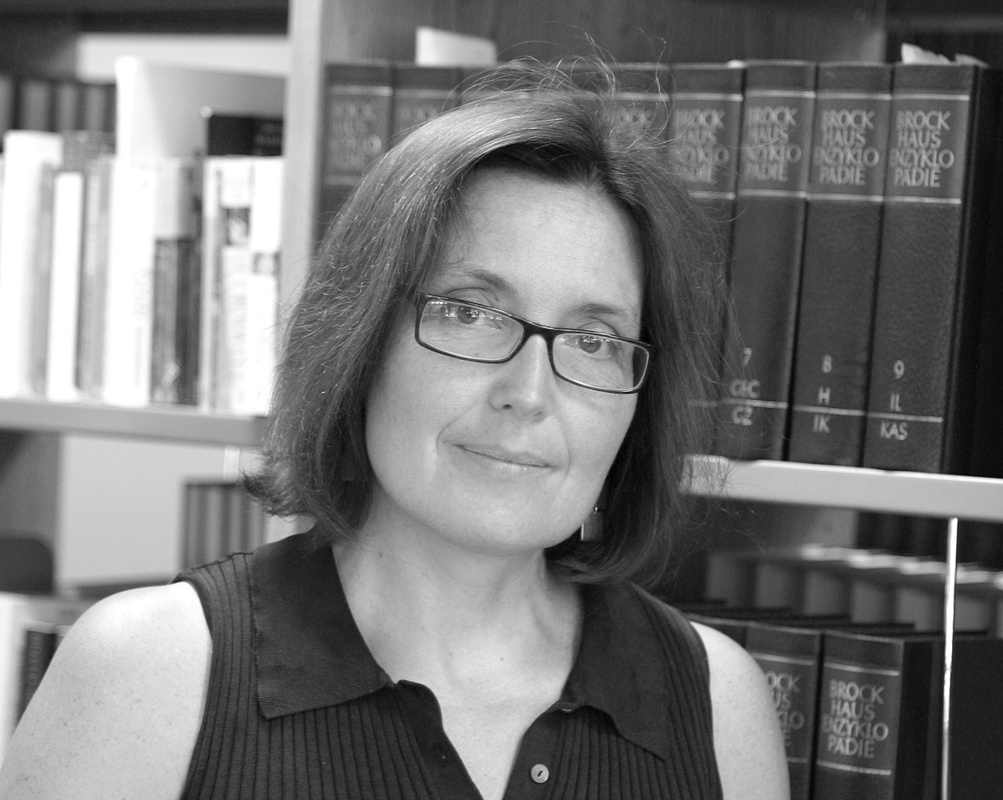
08 July 2019
The MPI-CBG loses a colleague and friend with the tragic demise of our dearest Suzanne Eaton, research group leader at the MPI-CBG and professor at the Biotechnology center of the TU Dresden. She went missing during a conference in Chania, Crete on July 2. The police recovered her body during the evening of 8th July.
26 May 2019
Marino Zerial becomes an elected member of the Istituto Veneto di Scienze, Lettere ed Arti, located in Venice and created by Napoleon for the Kingdom of Italy in 1810.
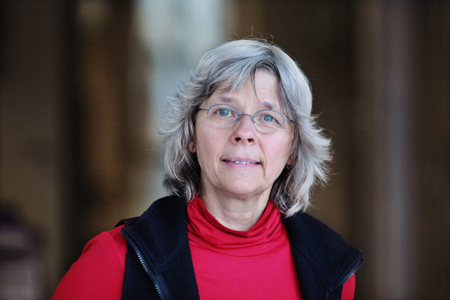
01 February 2019
Elisabeth Knust becomes Director Emerita. She joined in the Institute as director in October 2006.
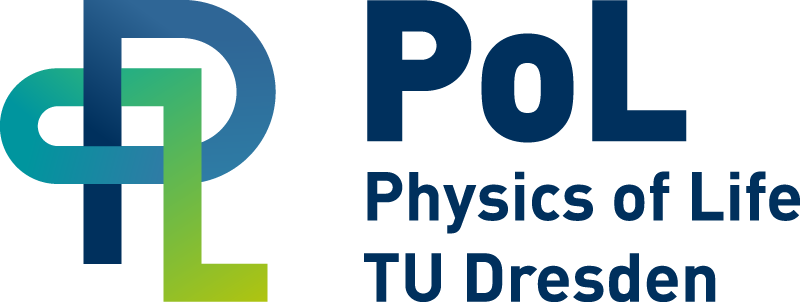
27 September 2018
The MPI-CBG and the Center for Systems Biology Dresden are part of a new Cluster of Excellence ‘Physics of Life’ at the TU Dresden.
14 September 2018
The Max Planck Society reaches out to the public with events all over Germany. In the Dresden Town Hall event, the three Dresden Max Planck Institutes, the MPI for Chemical Physics of Solids, the MPI for the Physics of Complex Systems, and the MPI-CBG, as well as the Center for Systems Biology Dresden jointly present their work.
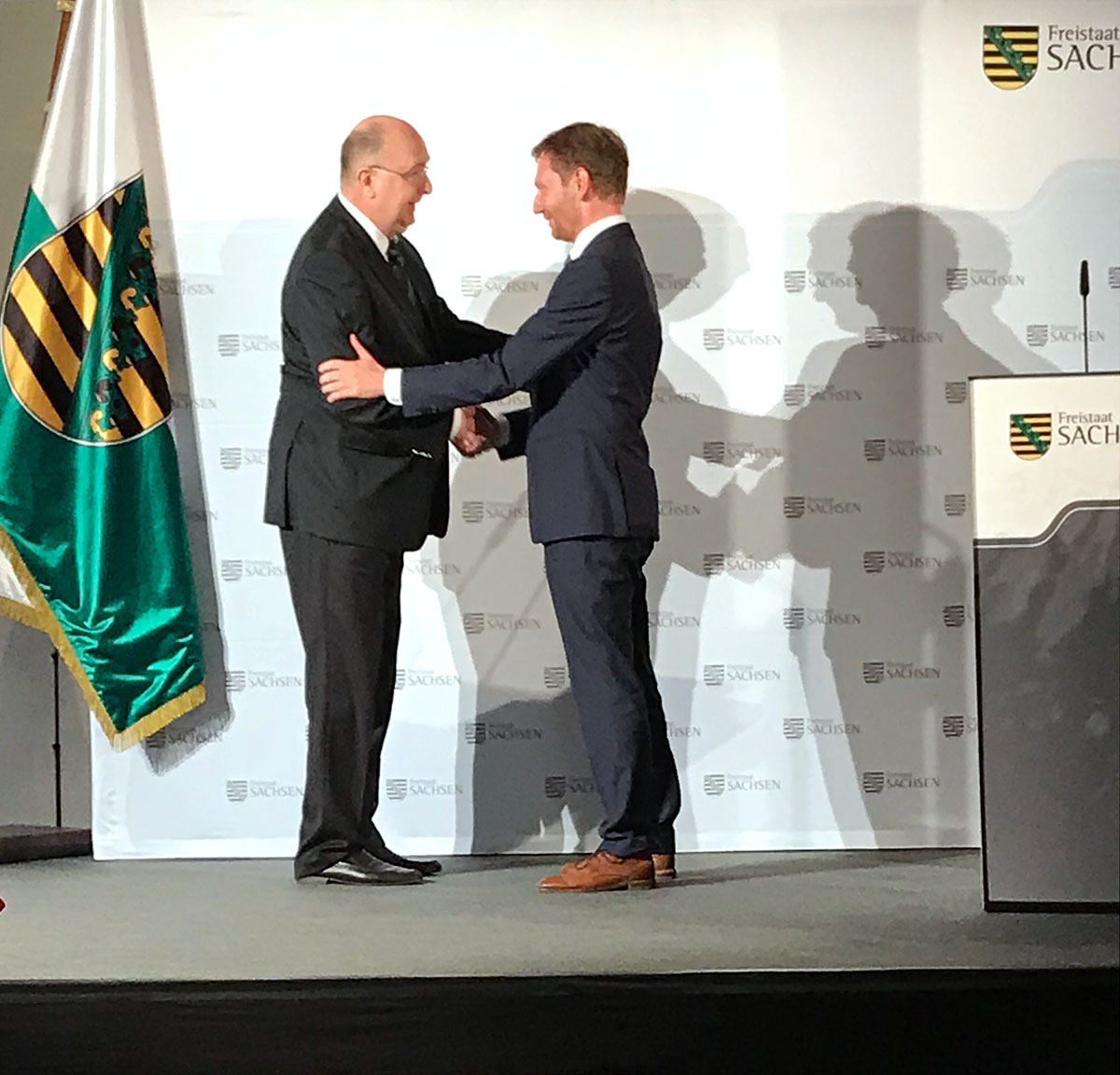
11 September 2018
The highest award of the Free State of Saxony goes to Wieland Huttner for the successful development of Dresden as a location for science.
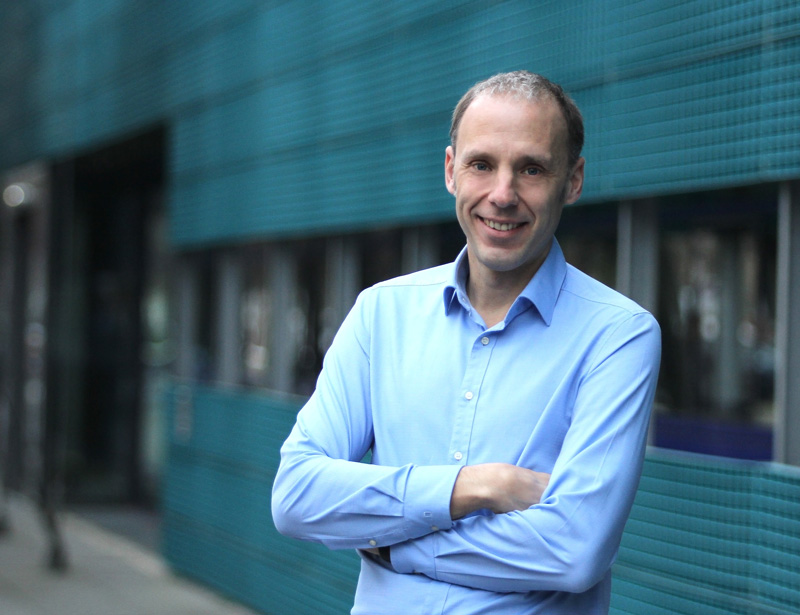
01 September 2018
Stephan Grill becomes a new director at the MPI-CBG. He strengthens our campus collaborations as he also stays a Professor of Biophysics at the Biotechnology Center of the TU Dresden and speaker of the Cluster of Excellence "Physics of Life" (PoL) at the TU Dresden.
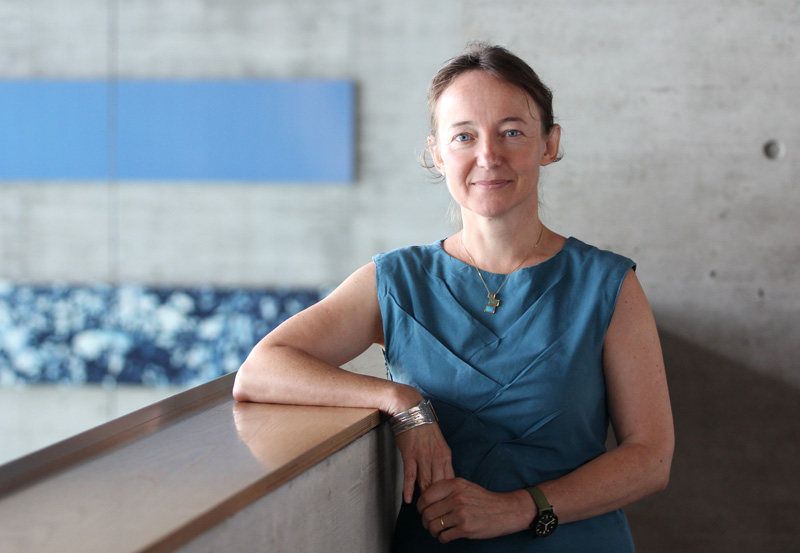
01 August 2018
Anne Grapin-Botton becomes a new director at our institute and enriches the Dresden science community with her research on organoids.
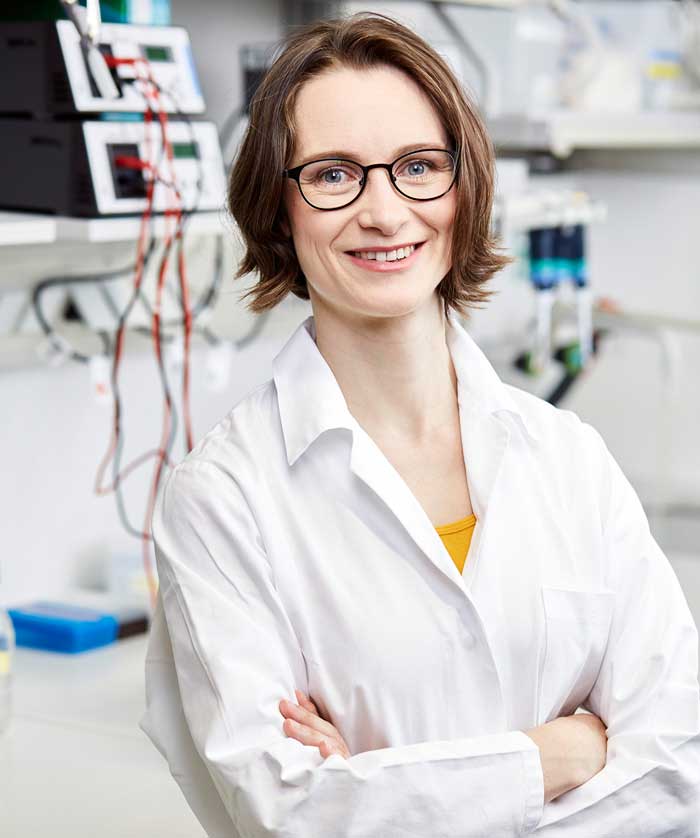
30 May 2018
FOR WOMEN IN SCIENCE award by the UNESCO Commission and the L’Oréal Foundation goes to Anne Wuttke, Zerial lab
14 March 2018
The TU Dresden and the MPI-CBG form a legal partnership for the creation and operation of the DRESDEN-concept Genome Center (DCGC). This partnership represents a novel form of cooperation in the German research community. On March 16, the German Research Foundation (DFG) approved funding for the DCGC as one of four Competence Centres for High-Throughput Sequencing.
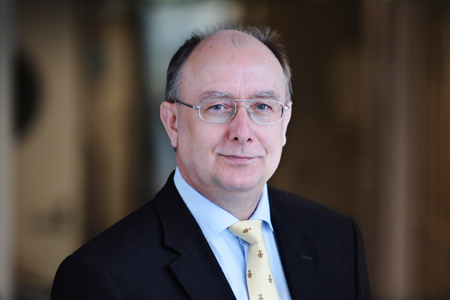
01 March 2018
Wieland Huttner becomes Director Emeritus. He is one of the founding directors of the MPI-CBG. His 68th birthday is celebrated with a symposium.
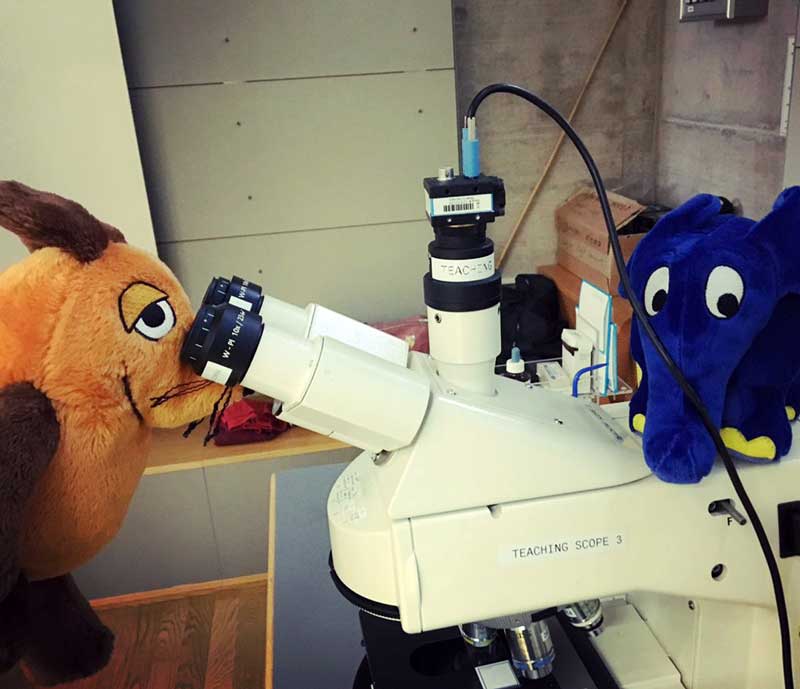
03 October 2017
The MPI-CBG and the neighbouring Center for Systems Biology Dresden (CSBD) take part for the first time in a nationwide open house day, called "Türöffner-Tag", organized by the famous German kids’ TV show "Die Sendung mit der Maus." In the MPI-CBG and the CSBD, children could experience light microscopy and Virtual Reality.
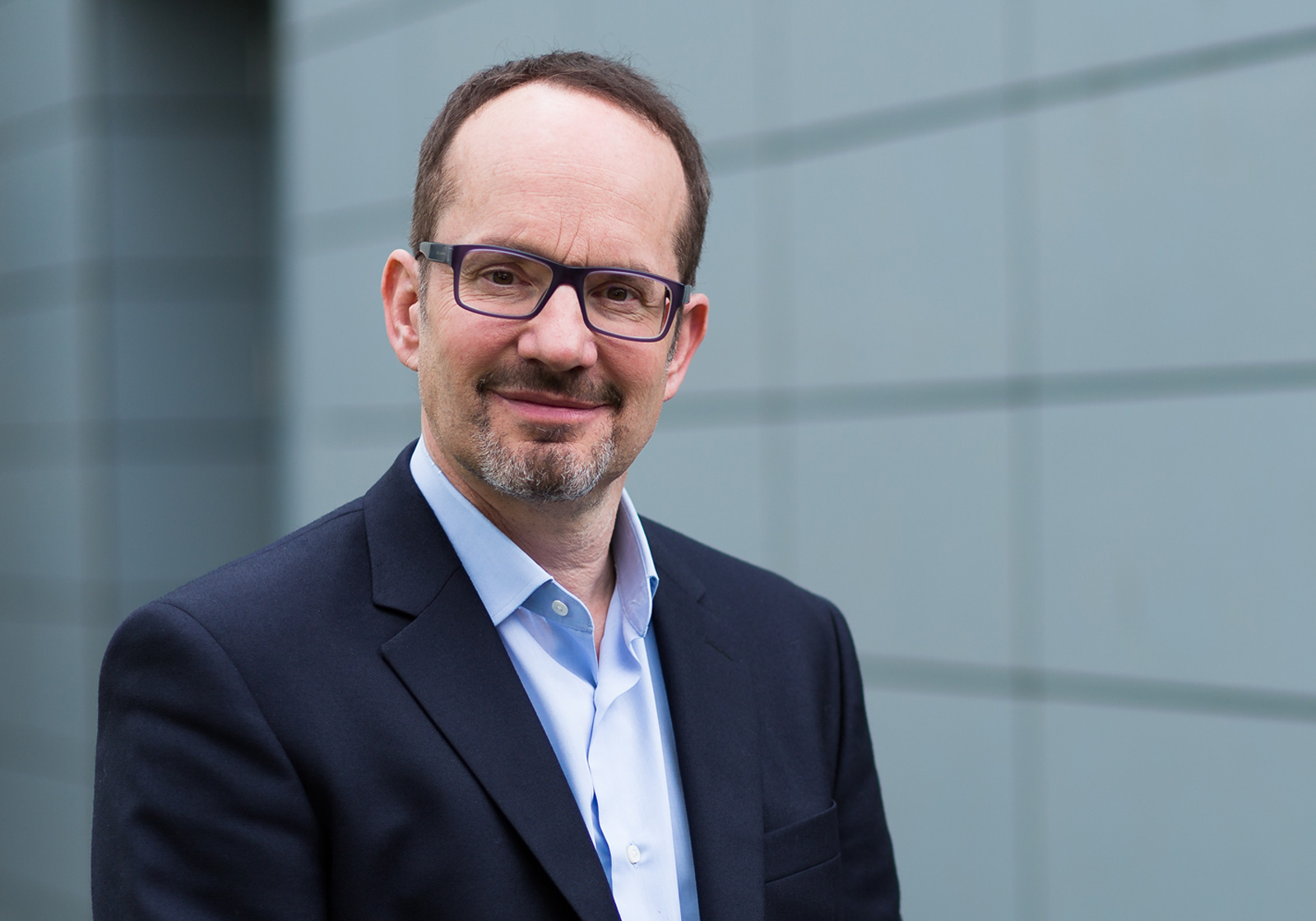
07 September 2017
Award for outstanding scientific work in the field of cell biology
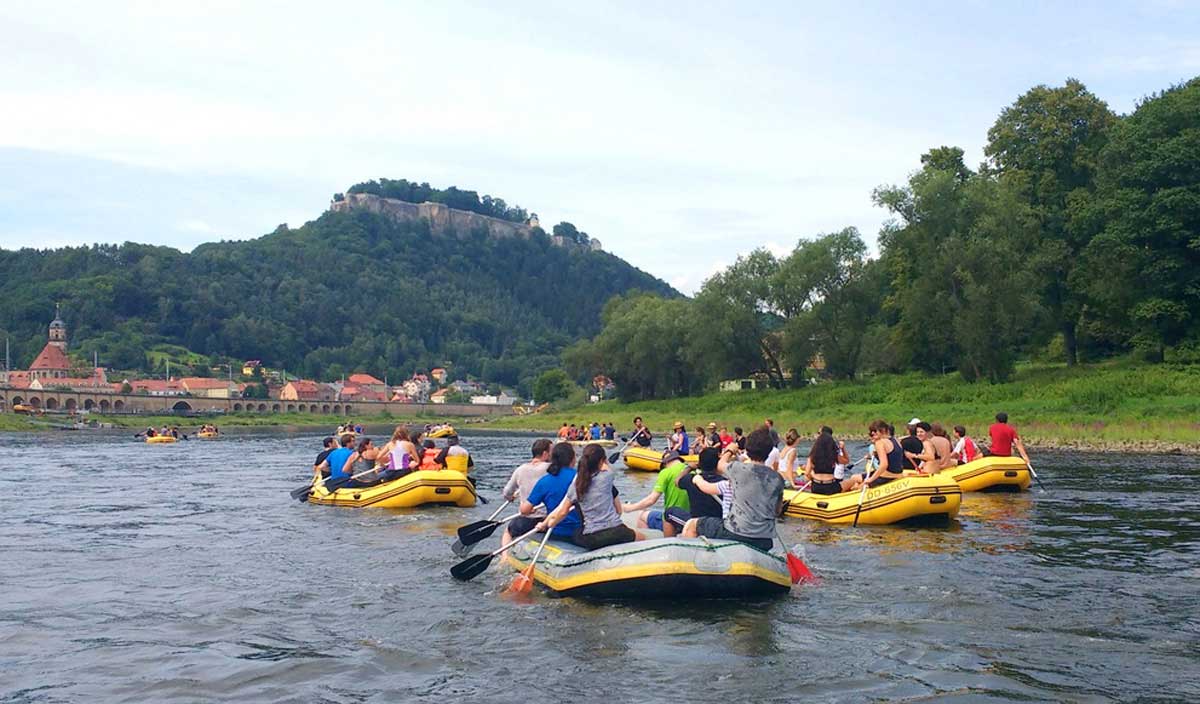
18 August 2017
2nd MPI-CBG Institute Day, a team-building event bridging all departments, facilities and research groups with a canoe trip on the river Elbe.
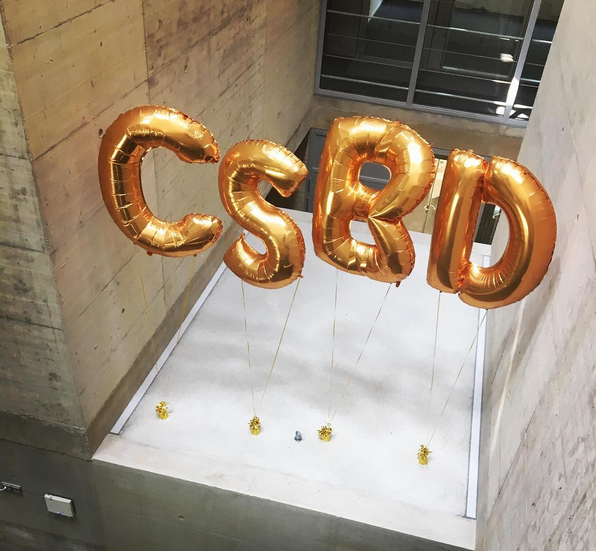
31 May / 01 June 2017
The new centre is an initiative of several institutions: the MPI-CBG, the Max Planck Institute for the Physics of Complex Systems, as well as the Technische Universität Dresden.
23 January 2017
PhD students at the MPI-CBG took a leading role in establishing the first Biopolis Dresden PhD Symposium - a symposium organized by PhD students from the whole Dresden Johannstadt campus for other PhD students.

27-29 October 2016
Anniversary Symposium with talks, lab reunions and parties to celebrate 15 years of MPI-CBG in Dresden.
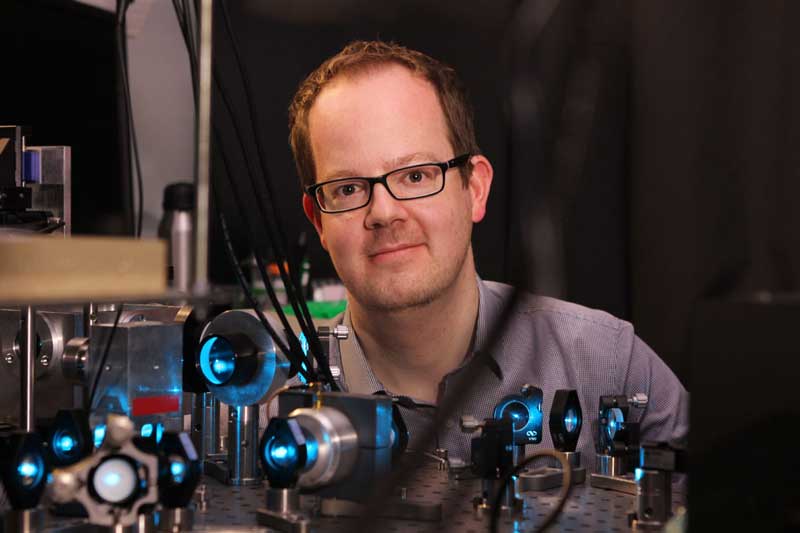
20 July 2016
Jan Huisken receives Medal for Light Microscopy
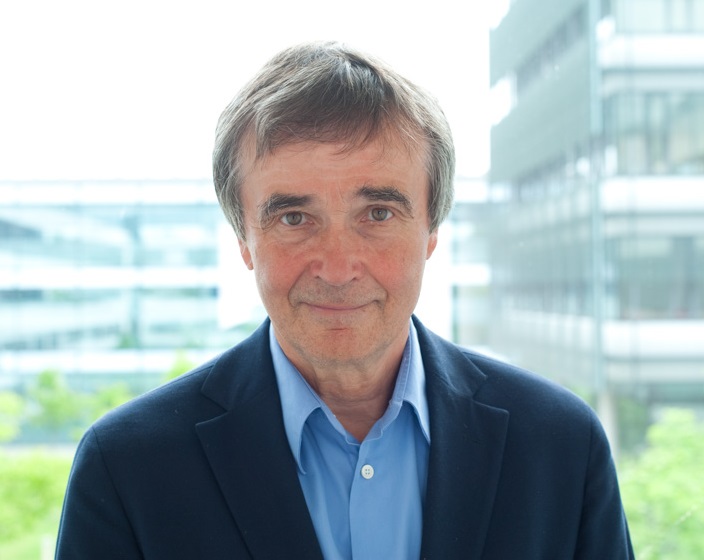
22 June 2016
Kai Simons receives the Robert Koch Gold Medal

15 April 2016
Kate Lee receives WOMEN IN SCIENCE award (Photo by Kai Bublitz for L’Oréal)
11-12 January 2016
"Polarity, polarity, I love it very much!": Symposium to celebrate the 65th birthday of Elisabeth Knust
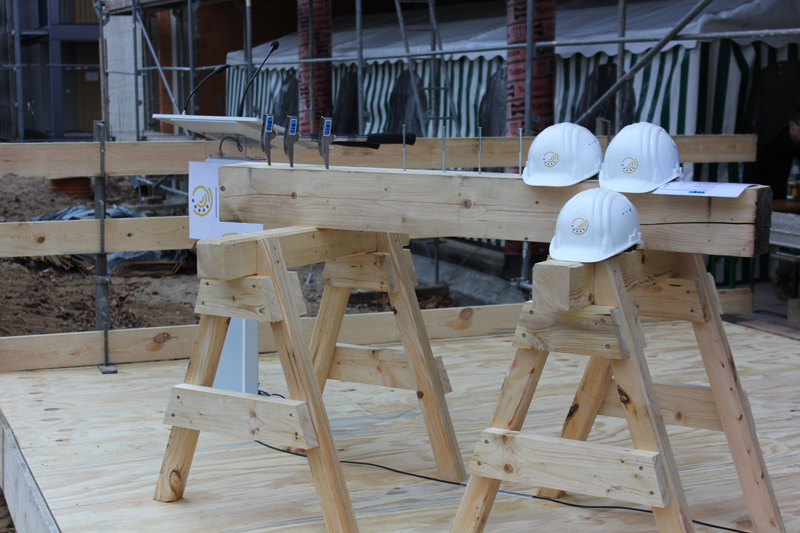
15 December 2015
Roofing ceremony for the CSBD. The celebration features addresses by Dirk Hilbert, Mayor of the City of Dresden, Gene Myers, the CSBD Founding Director, the Architect Janne Kentala (Heikkinen-Komonen Oy), Heike Kiko of the building department of the Max Planck Society, and the Construction Manager Maik Kiesewetter.
07– 09 October 2015
Evaluation of the Institute by the Scientific Advisory Board. This time it is an extended evaluation of the research field of which the Institute is a member.
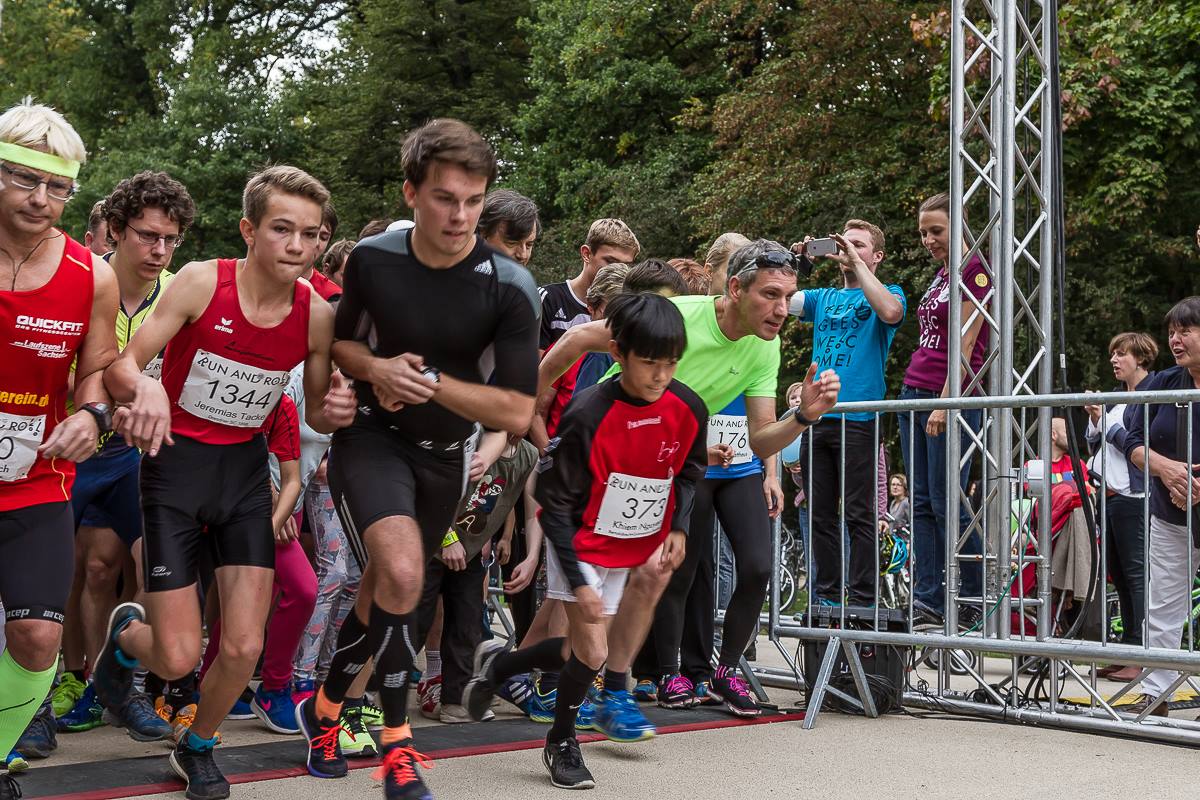
4 October 2015
“RUN & ROLL – Dresden bewegt sich!”, a charity run is organised together with the Dresden University Hospital and a number of partners. 3,500 people participate in the run, it raises 80,000 EUR for a special refugee clinic in Dresden.
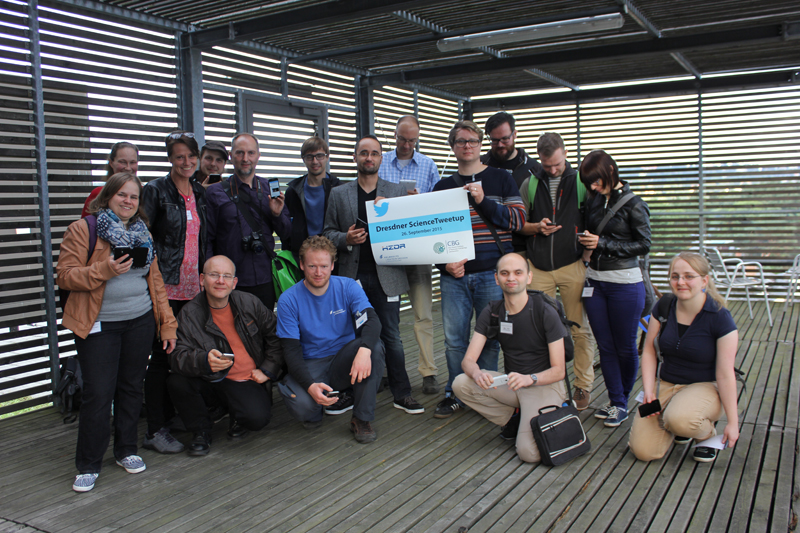
26 September 2015
The MPI-CBG together with the Helmholtz-Zentrum Dresden-Rossendorf hosts the 1st Dresden Science TweetUp.
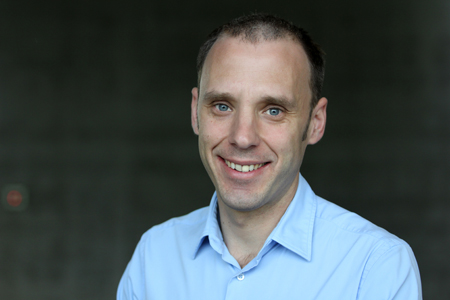
21 July 2015
Stephan Grill is appointed as Max Planck Fellow.
09–10 July 2015
First MPI-CBG Science Day, two days of talks on exciting frontier research and a summer party as grand finale.
21 November 2014
A new partner research group at the Tsinghua University in Beijing, China, is established. It is headed by Xin Liang.
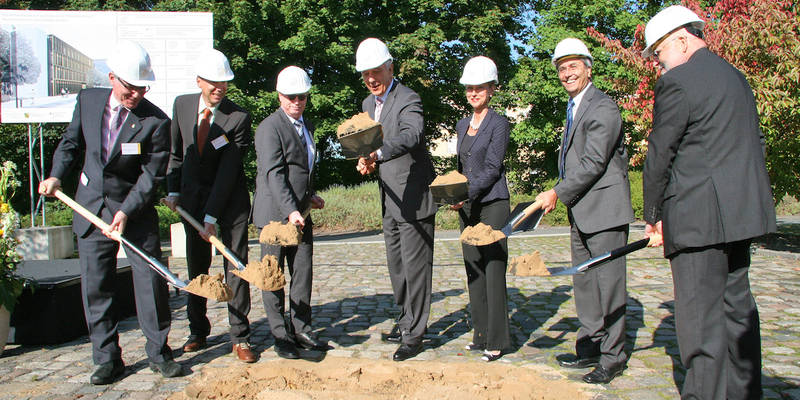
28 August 2014
The groundbreaking ceremony for the Center for Systems Biology (CSBD) takes place with the Minister President of the Free State of Saxony, Stanislaw Tillich, together with Martin Stratmann, President of the Max Planck Society, and Gene Myers.
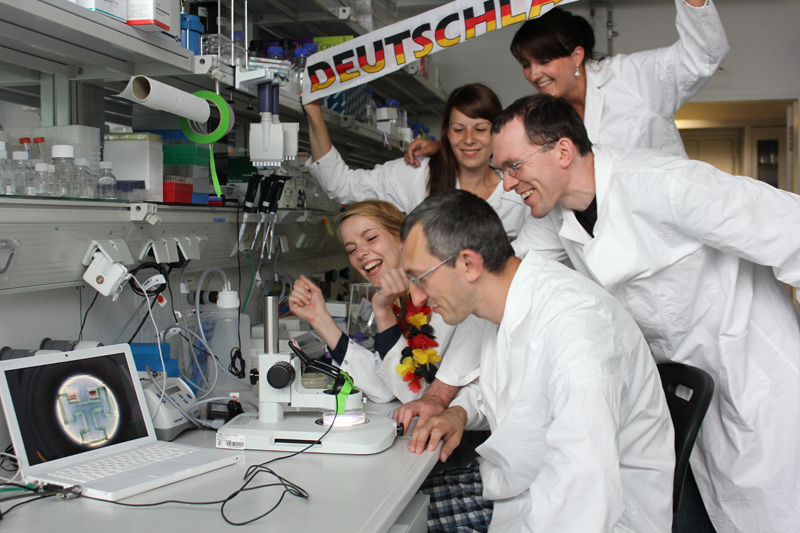
June/July 2014
During the 2014 FIFA World Cup, the research focus of the MPI-CBG shifts to identifying the gene regulatory networks underlying divination. The oracles research program studies Drosophila, Xenopus frogs, C. elegans, Red Flour Beetles, Zebrafish Oskar, the collective prediction power of the Yeastacle, and the planarians Frank, Collin, and Luigi.
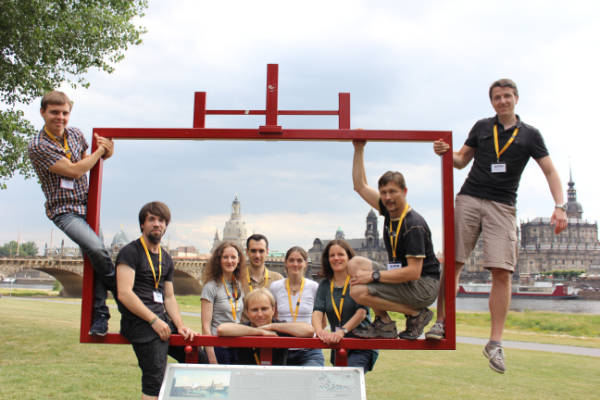
27 June 2014
First MPI-CBG Institute Day, a team-building event bridging all departments, facilities and research groups. A scavenger hunt in the city center floods Dresden with MPI people.

6 March 2014
The Happy MPI-CBG video with dancing scientists and dancing directors is released. More than 21,000 people watch it on YouTube.
31 December 2013
Joe Howard and Karla Neugebauer (Research Group Leader) accept an offer from Yale University and leave the MPI-CBG.
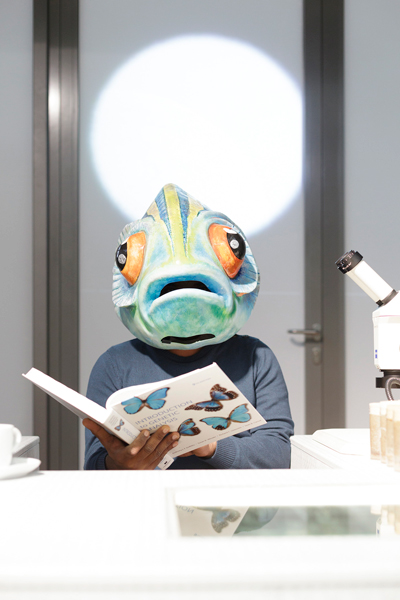
12 April 2013
Premiere of “Ziffer, Zelle, Zebrafisch”, a play on research and science staged in the MPI-CBG Galleria. It is a collaboration with the Theater Junge Generation Dresden and “CIE. Freaks und Fremde” and supported by the Klaus Tschira Foundation. In total, 63 shows with 2,979 visitors were performed until 2016.
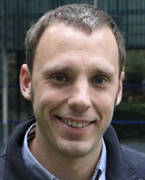
20 March 2013
Stephan Grill, research group leader at the MPI-CBG and the MPI for the Physics of Complex Systems is awarded the BINDER Innovation Prize 2013.
1 January 2013
Elly Tanaka is appointed as Max Planck Fellow at the MPI-CBG.

10-12 December 2012
Evaluation of the MPI-CBG by the Scientific Advisory Board. The SAB sees a clear "upward trend in the research performance even after 12 years".
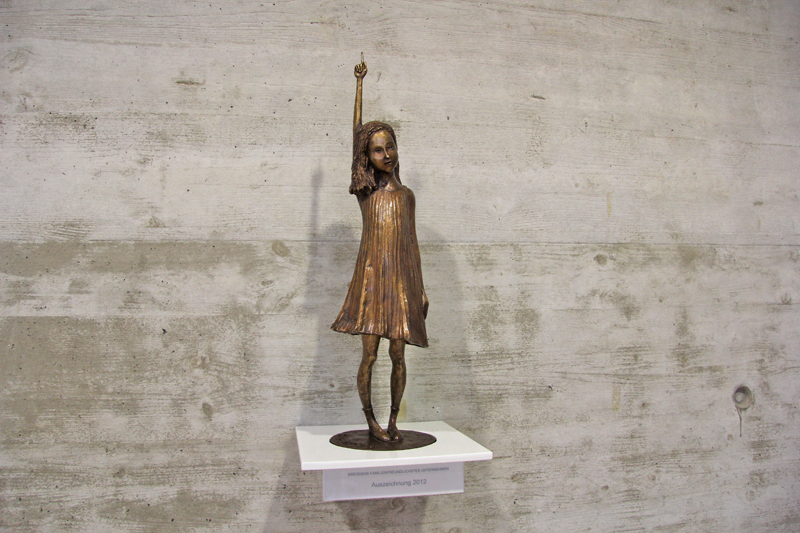
19 November 2012
The MPI-CBG is named the „Most family-friendly company in Dresden“. During a ceremony with the mayor of the City of Dresden, Helma Orosz, a sculpture by the Polish sculptor Malgorzata Chodakowska is handed over to the MPI-CBG management.
28 September 2012
First meeting of the MPI-CBG Board of Trustees (Kuratorium). The Kuratorium supports the Institute and fosters links between the public and the MPI-CBG. Its members are representatives from the local politics, industry, science, and the media.

23 March 2012
Gene Myers is recruited as Director and Research Group Leader. He starts at the MPI-CBG on 14 April 2012 (“nebenamtlich” - in addition to his official duties) and full-time on 1 June 2012. He is also the Founding Director of the Center for Systems Biology Dresden (CSBD).
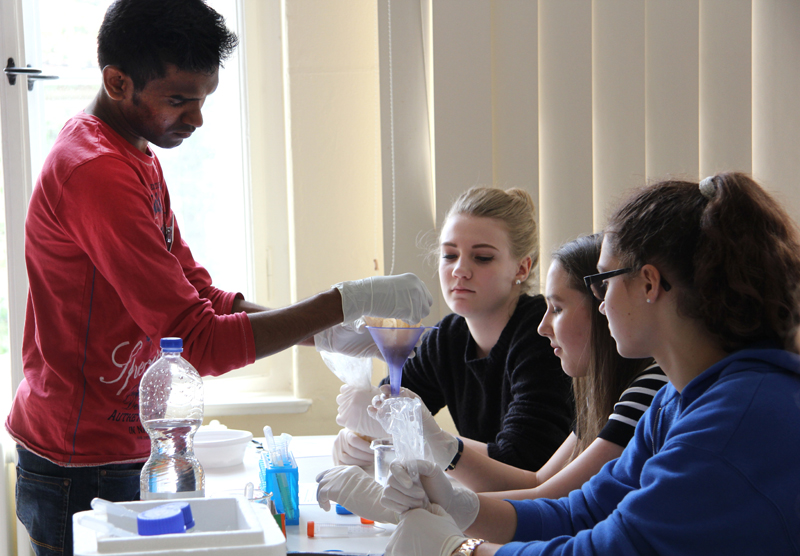
25 November 2011
The DIPP School Project “Science goes to school” is chosen out of 43 projects to be awarded the Sächsischer Integrationspreis. The award recognizes projects in Saxony that support tolerance and respect for people of different cultural, religious or ethnic backgrounds. Ten PhD students accept the award in a ceremony at the Landtag (Parliament) of Saxony with Mathias Rößler, chair of the Parliament.
27 September 2011
The Dresden Science Calendar is launched. It announces all upcoming scientific talks in Dresden via a unified internet platform.
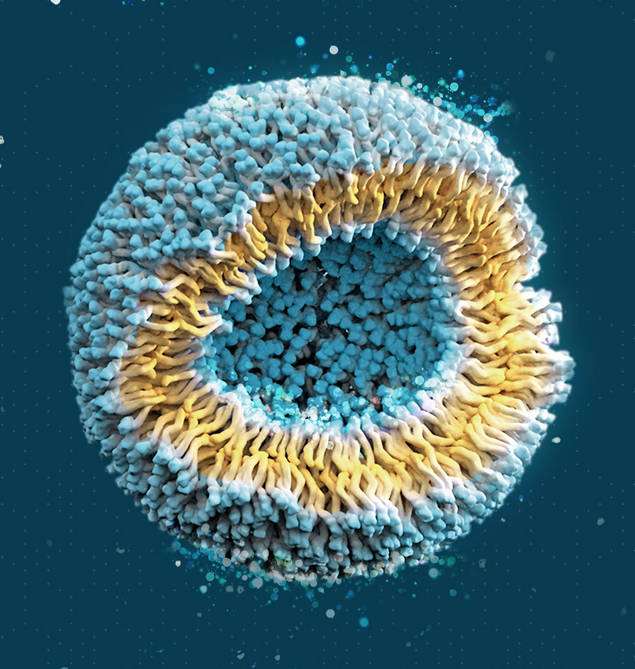
22 September 2011
The Indo-German Max Planck-NCBS Center on Lipid Research is founded. It is a collaboration of the MPI-CBG with the National Centre of Biological Sciences (NCBS) in Bangalore, India. The center is involved in the biochemical and biophysical analysis of biological membranes and the genetic analysis of lipid metabolic processes in various animal model systems.
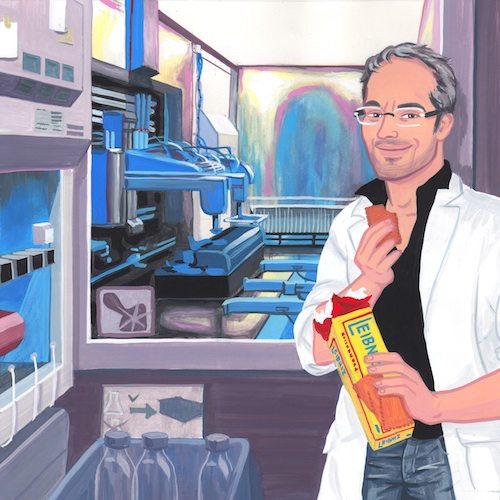
16 March 2011
Anthony Hyman, Research Group Leader and Director at the MPI-CBG, is awarded the Gottfried Wilhelm Leibniz Prize „for his major contributions to discovering the molecular mechanism of conserved cytoskeletal processes“.
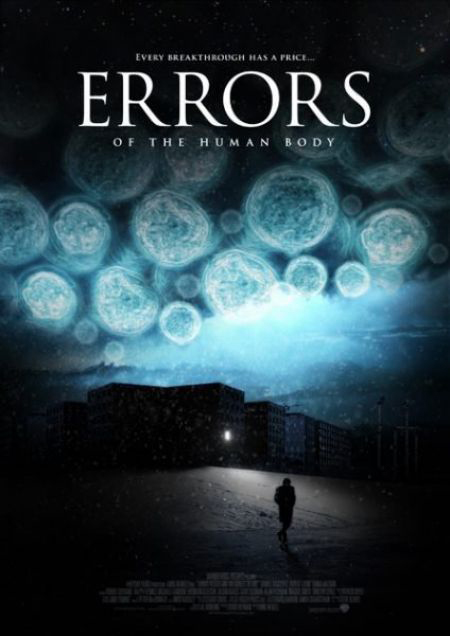
February 2011
The MPI-CBG turns into a film set: „Errors of the Human Body”, the first feature length movie by Australian writer and director Eron Sheean, is filmed at the Institute. It stars Karoline Herfurth, Tomas Lemarquis, and Michael Eklund in the lead role of Geoffrey Burton.

Where Computer Science and Physics meet Biology: The Center for Systems Biology (CSBD) is founded. It is the first inter-sectional center of the Max Planck Society. It is an extension of the MPI-CBG and the Max Planck Institute for the Physics of Complex Systems (MPI-PKS), with support from the Saxon State Ministry for Higher Education, Research and the Arts, the BMBF, and the Klaus Tschira Stiftung.
19 November 2010
As of this day, the Statute of the Institute is effective.
21-23 February 2010
Symposium for the 60th Birthday of Wieland Huttner, organized by Christof Niehrs and Marino Zerial.
28-30 October 2009
First extended evaluation of the MPI-CBG by the Scientific Advisory Board, which means that the Advisory Board evaluates the scientific performance of the MPI-CBG in comparison with selected other Max Planck Institutes from the same research field. Recommendations include starting a center in systems biology and recruiting of senior scientists in computation.
28 October 2009
The MPI-CBG is “Best Place to Work in Academia”. The Scientist magazine’s readers ranked the MPI-CBG as the top international academic institution. The MPI-CBG’s strengths include team-building, infrastructure and environment.

01 July 2009
Marwa El-Sherbini and her unborn child are killed in a Dresden court room. Her husband Elwy Okaz, a scientist at the MPI-CBG, is seriously injured while trying to protect her. Every year on July 1, the Institute remembers this tragedy with white roses in the atrium.
03 March 2009
The MPI-CBG joins Twitter with the handle @infooffice. The more official channel @mpicbg is added in May 2012.
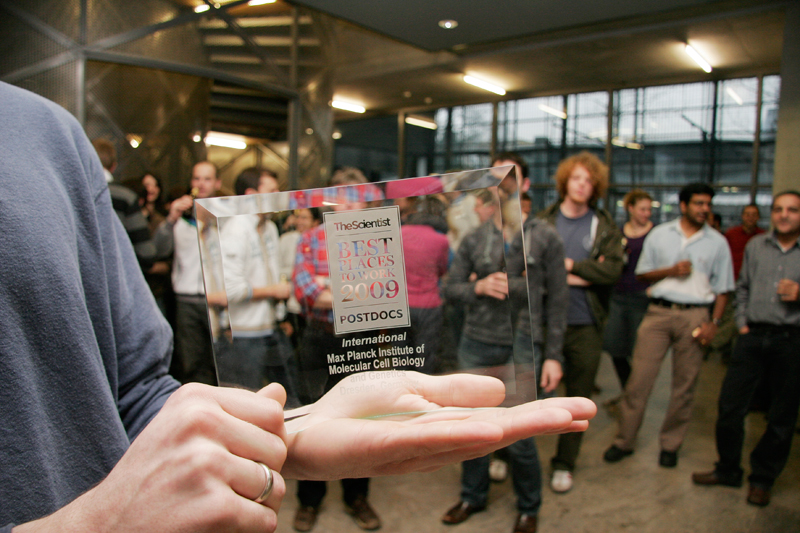
26 February 2009
The MPI-CBG is “Best Place to Work for Postdocs”. In a survey conducted among readers of The Scientist, the Institute is ranked number one for institutions outside of the United States.
01 July 2007
Michele Solimena (TU Dresden) becomes Max Planck Fellow at the MPI-CBG.
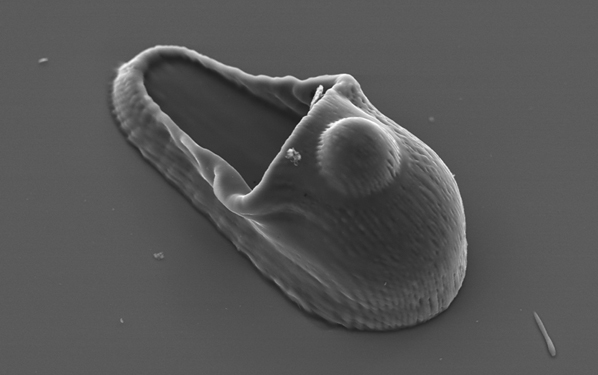
20 April 2007
Grit Ruhland, artist in residence and winner of the third MPI-CBG Art Prize, presents her work "Pantoffel für Pantoffeltierchen" (Slippers for Paramecia). The sculpture is 50 micrometers small and cannot be seen with the naked eye. It’s on display later in exhibits in Italy and New York.
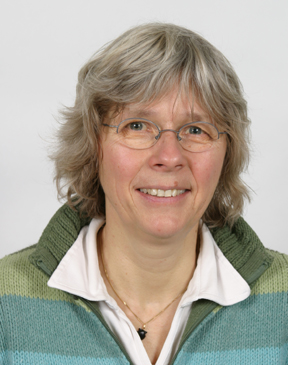
01 October 2006
Elisabeth Knust, professor at Heinrich-Heine-Universität Düsseldorf, is recruited as new Director and Research Group Leader to succeed Kai Simons. The appointment by the President of the Max Planck Society is a so-called „Eilentscheidung“ (express decision): Her contract starts on October 11.
18-19 September 2006
Evaluation of the Institute by the Scientific Advisory Board.
31 May 2006
Kai Simons becomes Director Emeritus. He was the primus inter pares during the build-up phase of the Institute.
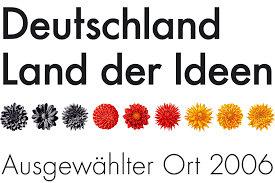
03 March 2006
The MPI-CBG is selected to be one of 365 places to represent Germany during the 2006 FIFA World Cup in the „Land of Ideas“ program by the German government. The award ceremony is combined with a poetry slam on biology and genetics in the MPI-CBG Auditorium – Lawrence Rajendran wins with a poem on Alzheimer’s disease.
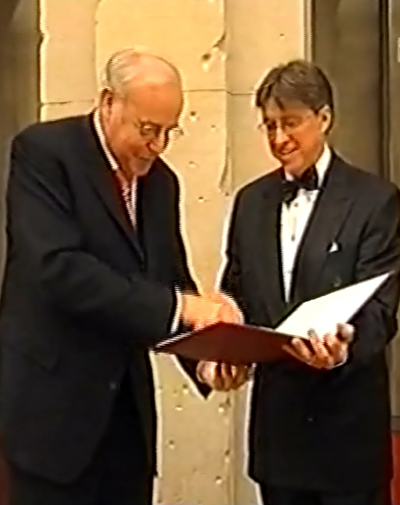
08 February 2006
Marino Zerial, Research Group Leader and Director at the MPI-CBG, receives the Gottfried Wilhelm Leibniz Prize at the Berlin-Brandenburg Academy of Sciences in Berlin. The Leibniz Prize is the highest honour awarded in German research by the German Research Foundation (DFG).
Two partner groups are established: One headed by Marta Miaczynska at the International Institute of Molecular and Cell Biology (IIMCB) in Warsaw (2006-2010), and one on „Pre-mRNA splicing and organization of the cell nucleus“ headed by David Stanek at the Charles University in Prague. The latter group moved to the Institute of Molecular Genetics, Academy of Sciences of the Czech Republic in 2007.
24 November 2005
The Max Planck Fellows Program is launched by Peter Gruss, President of the Max Planck Society. The program strengthens cooperation between Max Planck Institutes and universities. Petra Schwille, professor at TU Dresden, is appointed as Max Planck Fellow at the MPI-CBG.
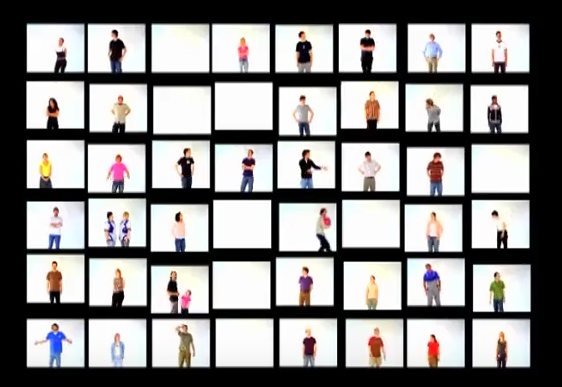
03 November 2005
Nadja Schütt’s video work PingPong premieres. The video installation features 40 MPI-CBG staff members and illustrates how communication works at the Institute. Schütt is the second winner of the MPI-CBG Art Prize.
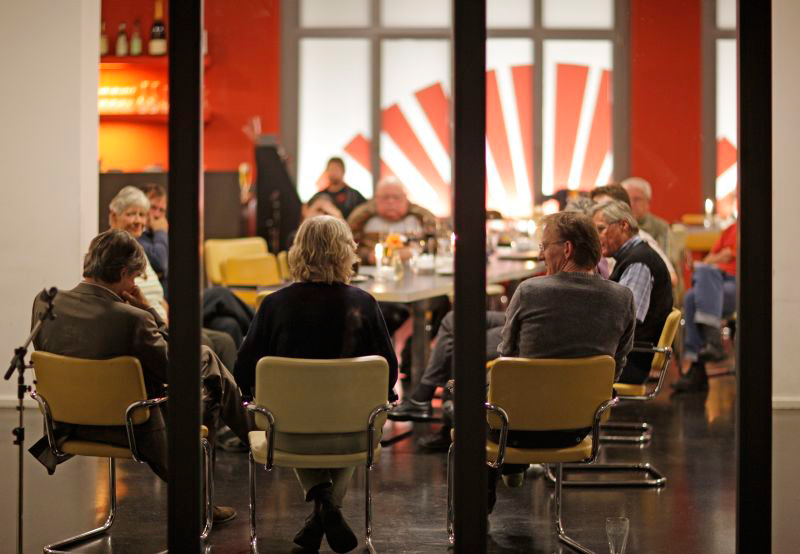
30 November 2004
First session of the Science Café is held at the Restaurant Lingner in Hygienemuseum. The Science Café is a casual discussion format on science & society-related topics. The first session entitled "Wie zerbrechlich ist der gläserne Mensch?" was about genetic testing and data privacy with Andreas Schurig, Data Protection Officer of the Free State of Saxony, and with Giuseppe Testa and Tobias Heckel of MPI-CBG.
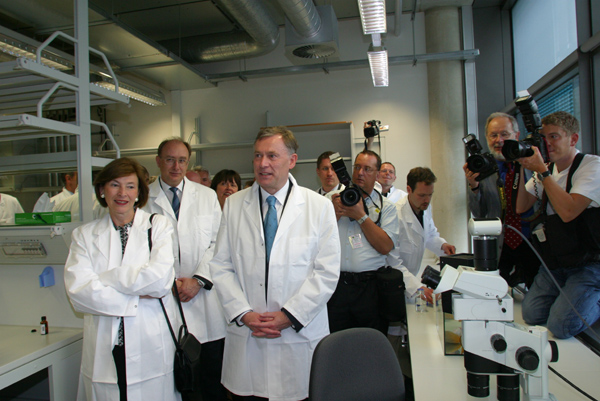
09 July 2004
During his official inaugural visit to the Free State of Saxony, the Federal President of Germany, Horst Köhler, tours the MPI-CBG. He comes with his wife Eva Köhler and with Georg Milbradt, Minister President of Saxony, and Milbradt's wife Angelika Meeth-Milbradt.
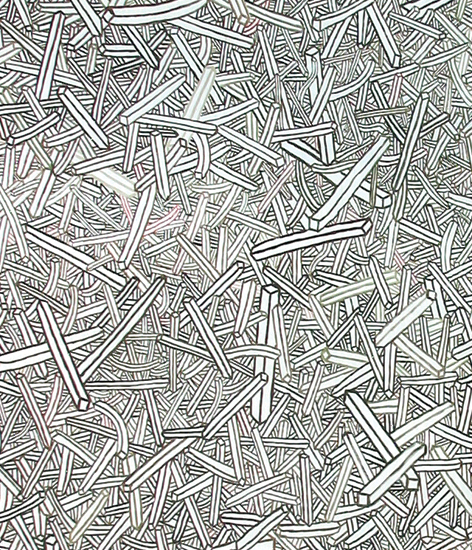
04 February 2004
The first MPI-CBG Art Prize is awarded to Rocco Pagel, advanced student (“Meisterschüler”) at the Dresden Art Academy. The Art Prize was founded to show the connections between the art and science world. Pagel’s painting “Beautiful Cell/Schöne Zelle” still hangs above the Galleria seminar room.
29 September - 02 October 2003
First visit of the Scientific Advisory Board.
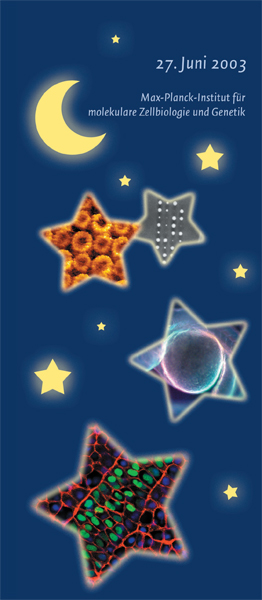
27 June 2003
The MPI-CBG helps to host the first Dresdner Lange Nacht der Wissenschaften.
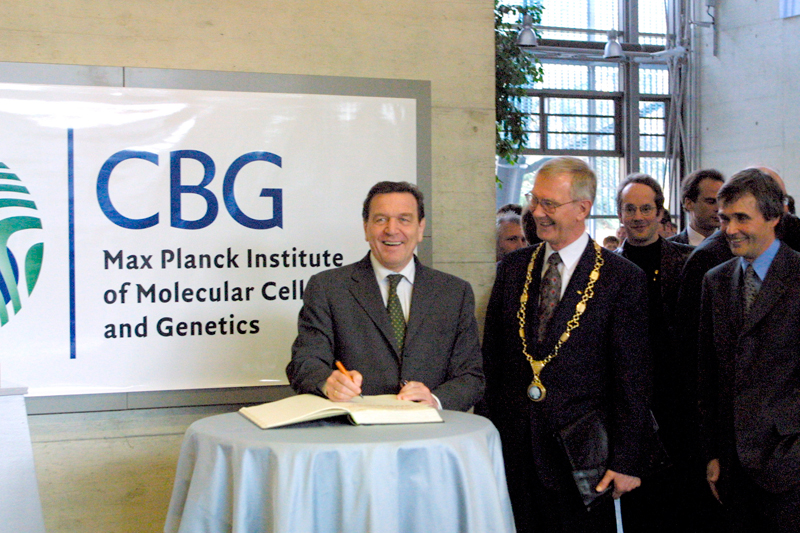
27 March 2002
Symposium to inaugurate the new building. VIP guests are the Federal Chancellor of Germany Gerhard Schröder, Kurt Biedenkopf (Minister President of Saxony), Hubert Markl (President of the Max Planck Society), Ingolf Roßberg (Mayor of the City of Dresden), and Achim Mehlhorn (Rector of TU Dresden).
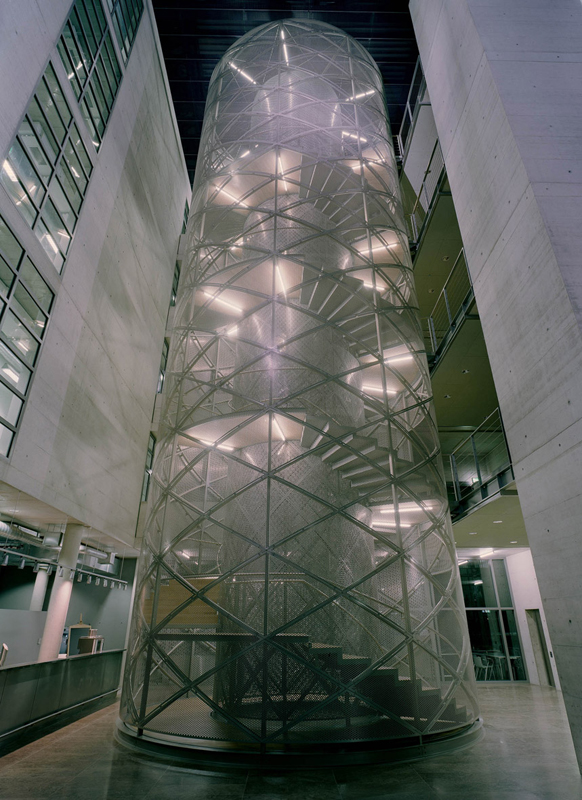
14 February 2002
The MPI-CBG is selected by the Finnish concrete industry as the "concrete structure of the year". The prize is awarded in Helsinki.
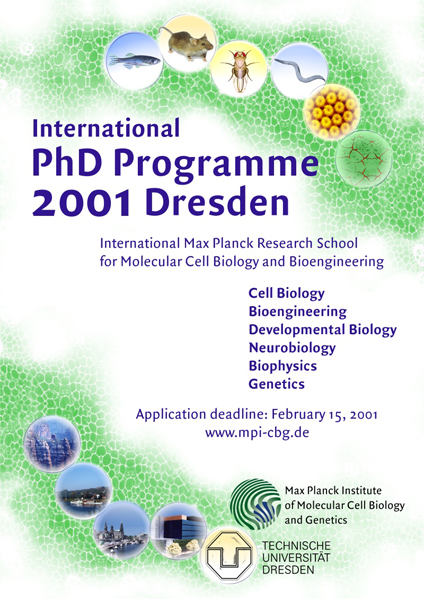
April 2001
The „International Max Planck Research School for Molecular Cell Biology and Bioengineering“ is established. It is a collaboration with the Technische Universität Dresden (TU Dresden). The Program Spokesperson is Wieland Huttner.
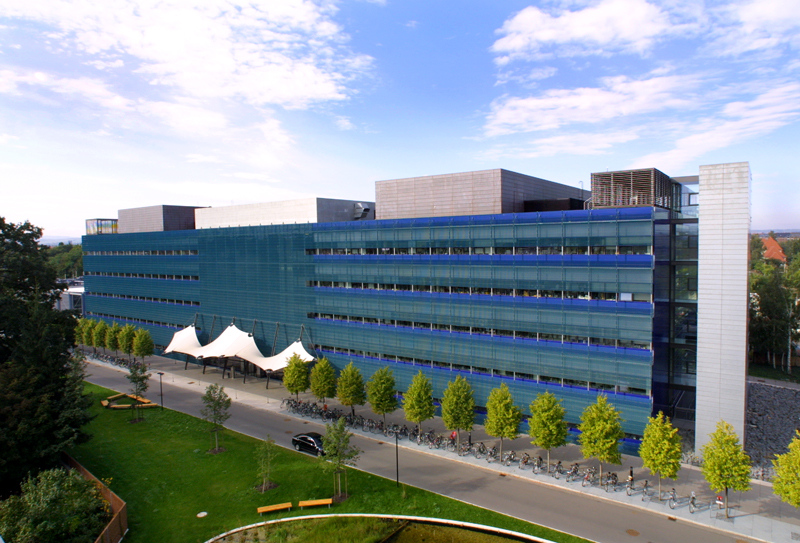
22 January 2001
First research groups move into the new building.
03 April 2000
Hubert Markl, President of the Max Planck Society, and Miroslav Mossakowski, President of the Polish Academy of Sciences, agree to establish two junior research groups and share the funding. The first one is headed by Matthias Bochtler and located at the International Institute of Molecular and Cell Biology (IIMCB) in Warsaw, Poland, and becomes operational in December 2000. In return, Ewa Paluch heads a research group based at the MPI-CBG from 2006.
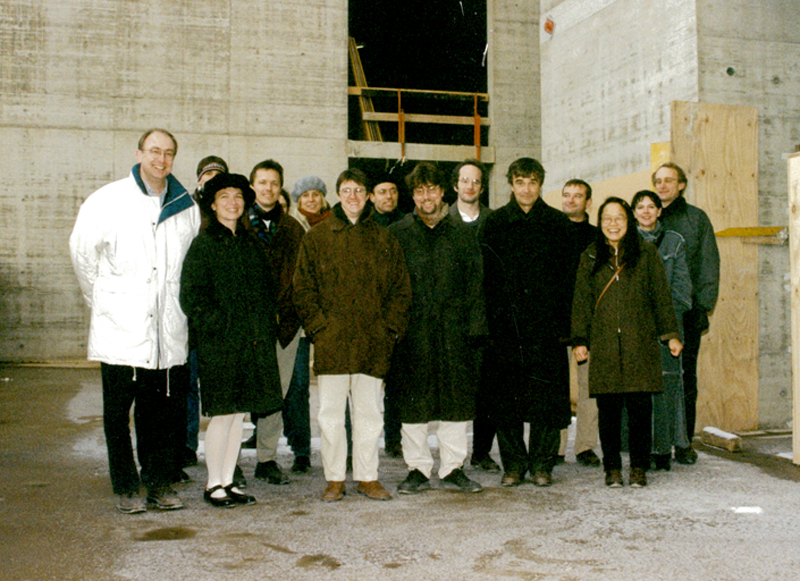
A symposium to recruit the first Research Group Leaders is held in Dresden.
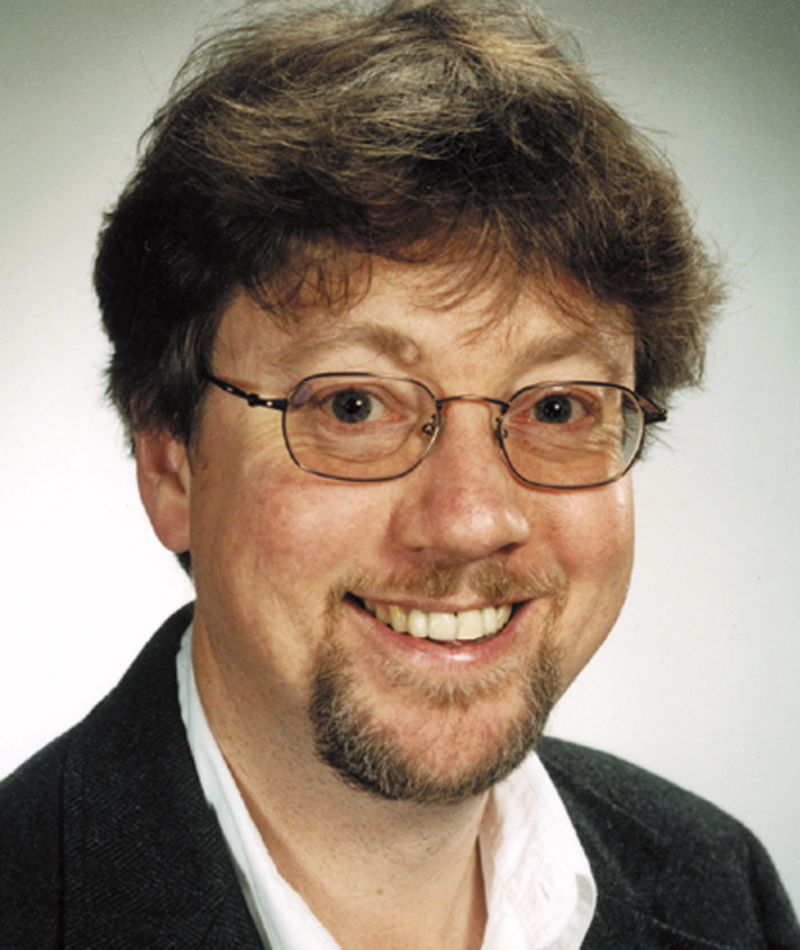
19 November 1999
Jonathon Howard is recruited as Director and Research Group Leader. His contract starts on January 1, 2000. In the beginning, Joe is still based in Seattle.
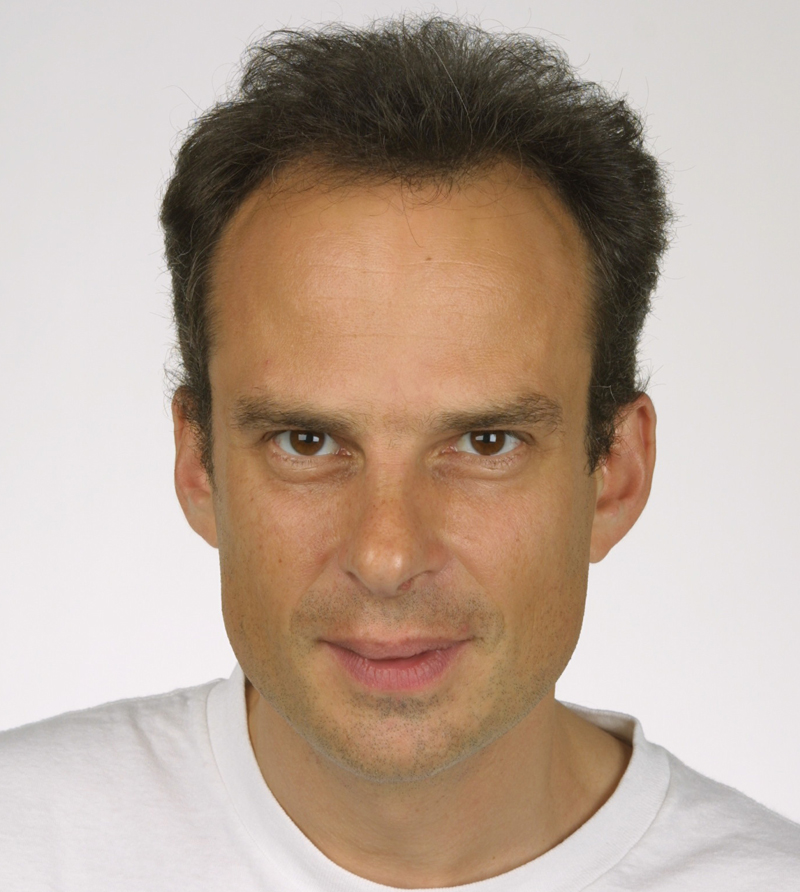
01 November 1999
Ivan C. Baines joins the team. He directs the scientific facilities and services of the Institute, and supervises the founding of biotech start-ups emerging from the MPI-CBG.
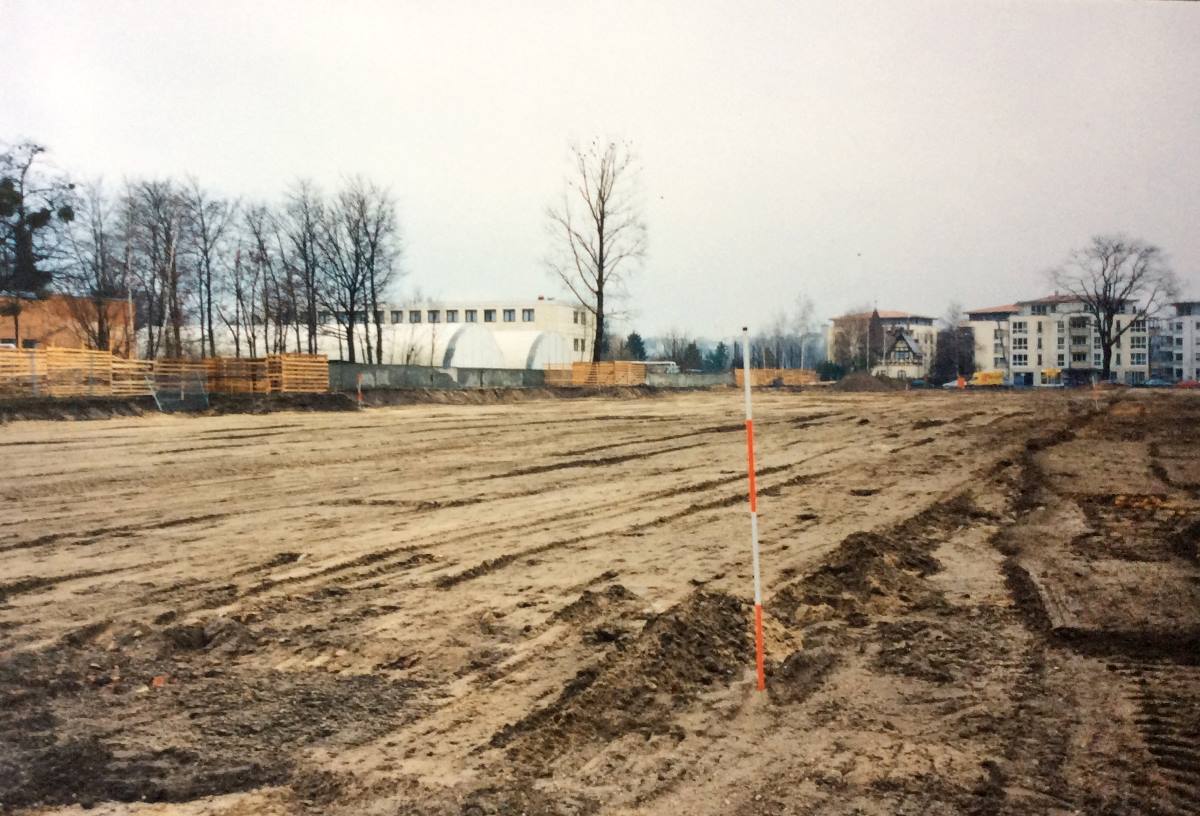
April 1999
Construction begins for the new building on Pfotenhauerstraße 108. The Institute building is designed by the Finnish architects Heikkinen-Komonen and Henn Architekten from Munich and costs 55 million EUR. The construction phase takes less than two years: the first research groups move in on 22 January 2001.
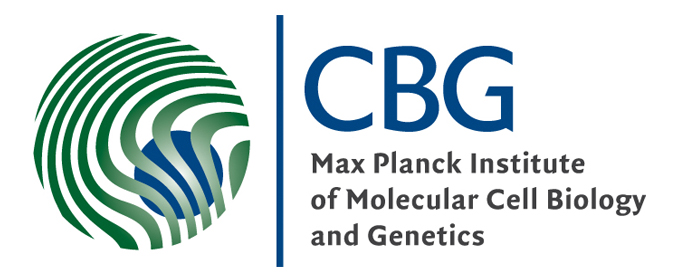
01 January 1998
The first research groups start working in Heidelberg, Göttingen, and Berlin before the new building is finished. By the end of 1998, the Institute has 32 staff members (26 of them scientists). This will grow to 117 in 2000.

06 December 1997
Kai Simons, Marino Zerial, Wieland B. Huttner, and Anthony A. Hyman (from left to right) are recruited as Founding Directors to start on January 1, 1998. They signed their contracts with the Max Planck Society using one and the same pen.
They are all based in Heidelberg at that time. Dresden is identified as the location for the new institute.
07 March 1997
The decision is taken by the Senate of the Max Planck Society to found the „Max Planck Institute of Molecular Cell Biology and Genetics (MPI-CBG)“.
10 January 1994
The Max Planck Commission on „Research Perspectives within the Biological-Medical Section of the Max Planck Society“ recommends establishing an institute working in the field of genetics, molecular cell biology, and protein folding.